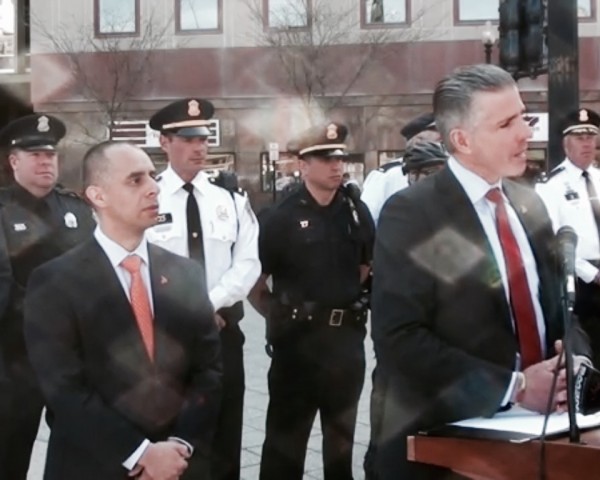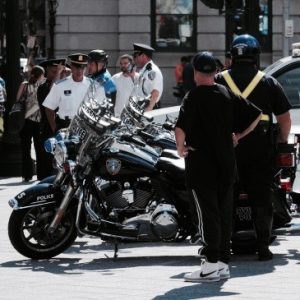
Rhode Island’s cultural diversity is one of our great assets, but our communities often experience different opportunities to engage and enjoy. If we want our state to be more equitable, we require courageous leadership and intentional investments in racial and economic equity and access.
As organizations committed to racial justice, we feel the issue of race has been missing from the discussion about Kennedy Plaza. We all want to see vibrant community commons that support our economic and community development. But we recognize that strategies like increased policing will continue to disadvantage the poor, especially people of color, and siphon dollars away from social safety net programs that uplift those most marginalized.
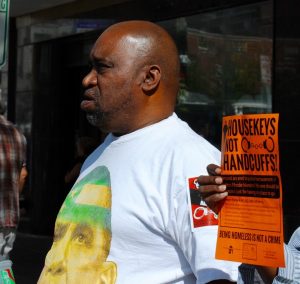 New England communities were built with public “commons,” but despite their name these public spaces have always excluded the most disenfranchised: the indigenous people whose land was stolen, the enslaved Africans who quite literally built our communities, and those who did not fit society’s image of proper decorum. This continues today, with increase policing and criminalization of black and brown bodies, those exhibiting impact of addiction or mental illness, and the poor and homeless.
New England communities were built with public “commons,” but despite their name these public spaces have always excluded the most disenfranchised: the indigenous people whose land was stolen, the enslaved Africans who quite literally built our communities, and those who did not fit society’s image of proper decorum. This continues today, with increase policing and criminalization of black and brown bodies, those exhibiting impact of addiction or mental illness, and the poor and homeless.
As our allies who are advocating for the homeless pointed out in their excellent “Reclaiming our Public Spaces” report, we cannot simply sweep away the poverty that many don’t want to see. Poverty and homelessness have disproportionate impact on communities of color, in large part because of public policies that exclude particular racial and ethnic groups from the supports that help build wealth and economic stability. Public policies fit together like bricks to shape our society, and our vision for racial justice requires some shifts in thinking. More people with criminal records, out of our workforce and warehoused at public cost, doesn’t help us build the society we envision.
Rather than seeking to invest our resources in short-sighted efforts to remove people we have deemed “undesirable,” let’s make real investments in the type of community supports and assets that eliminate the need for panhandling, support mental health and addiction recovery, and provide living wage jobs for everyone, including those with criminal records. Let’s engage our business community support in increased wages, publicly funded detox and recovery support, development of affordable housing, and compliance with First Source and Ban the Box laws. Let’s provide meaningful, well-paying work opportunities for adults with moderate education, and support public access to skilled training and higher education for our youth. Let’s recognize that amenities like public restrooms, drinking fountains, increased seating, and charging stations will support many types of users. And let’s bring love and compassion to the struggle of all those in our community, even those whose circumstances or behavior might make us uncomfortable.
Mike Araujo, Executive Director, Rhode Island Jobs with Justice
James Vincent, President, NAACP Providence Branch
Chanda Womack, President, Board of Directors, Cambodian Society of Rhode Island
On behalf of the Racial Justice Coalition.
]]>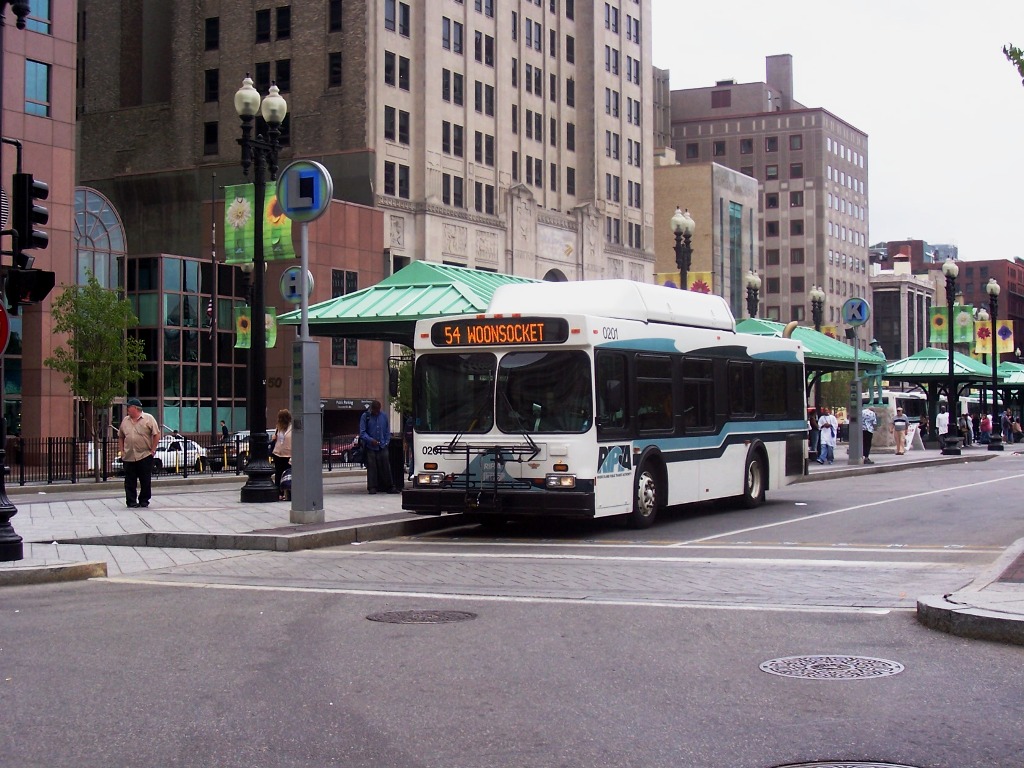 Have you heard about the $17 million “Downtown Enhanced Transit Corridor” grant that the city of Providence received for the Rhode Island Public Transit Authority to develop a 6-stop enhanced bus corridor to run from the Providence Railroad station to a new bus hub in the hospital district? Its largely the route originally planned to be for a streetcar.
Have you heard about the $17 million “Downtown Enhanced Transit Corridor” grant that the city of Providence received for the Rhode Island Public Transit Authority to develop a 6-stop enhanced bus corridor to run from the Providence Railroad station to a new bus hub in the hospital district? Its largely the route originally planned to be for a streetcar.
RIPTA is organizing a “stakeholder” group to advise on implementation, the first meeting of which is scheduled for October 24. The RIPTA Riders Alliance, of which I am a member, was invited to participate. An open public meeting for all may be scheduled later.
$17 million should be enough to be a potential game-changer for downtown and for RIPTA, both of which are struggling. Indeed RIPTA ridership has dropped significantly in the last 2 years, from about 20 to 18 million riders. Not long ago the RIDOT Director publicly called RIPTA a “failure” because of our low commute by transit rate. The decision by Citizens Bank to locate a huge corporate “campus” west of I-295 where there is no transit is an indication of how little RIPTA can matter to employers. Downtown is hurting too, from the long empty “Superman” building to the well publicized perception of unpleasant conditions and “chaos” in Kennedy Plaza.
RIPTA planners have said they intend to use the $17 million grant to jazz up the bus stops with enhanced amenities, to buy some ultra-clean hybrid buses, and have six of their lines (#1,3,6,51,58,72) routed on the
corridor to ensure very frequent service.
While this includes some good ideas, at $2/ride, soon likely to be $2.50, I don’t see how this will attract many new riders who don’t already have a pass or ride free anyway. I don’t see how this expensive fare will do much to attract attention of those wanting to do business that might lead to economic redevelopment. Thus I suggest that the buses RIPTA wants to buy be used to establish a free loop on that corridor.
About a year ago the Coalition for Transportation Choices hosted a meeting here with invited speakers from Denver, Minneapolis and Hartford where transit initiatives were successful in building ridership and spurring economic development. One thing Denver and Hartford (New Haven too) did to help do this was to institute a free bus shuttle connecting their train stations, also on the periphery, to key central locations. So this can be done! I’ll also add that having lived in Oregon 1974-75 when Portland OR was considered a failed city with a dead downtown, one thing they did, (Seattle too) to turn things around was to institute a fare-free downtown zone to get people more used to using transit and to come downtown where they can get around easily. This was a great success even if it could not be sustained through the 2008 recession.
Not just those that love cities, we all have a stake in having our central city and transit system succeed as they have so much potential to contribute to the problem of combating climate change.
Those who think this is an idea worth exploring need to encourage RIPTA to reconsider. Operating funds for the shuttle is a problem, but if there is a will to do so perhaps Federal “CMAQ ” funds can be reprogrammed for this purpose, at least for a few years. (CMAQ helped support operating the old Providence-Newport ferry and the South County commuter rail.) After the bad publicity on Kennedy Plaza, both for the buses and the city, something needs to be done to get positive attention. And a free shuttle will help strengthen the value of our Northeast Corridor location and commuter rail access TO Providence, from the north and south.
This project, together with enhanced policing and better services for the homeless and mentally ill in the Plaza, can begin to turn the situation around for the better. For reasons of environment, economy, and quality of life, and for those who love cities, we don’t want to squander this opportunity created by this grant to make a real improvement on our economy, environment, and quality of life.
]]>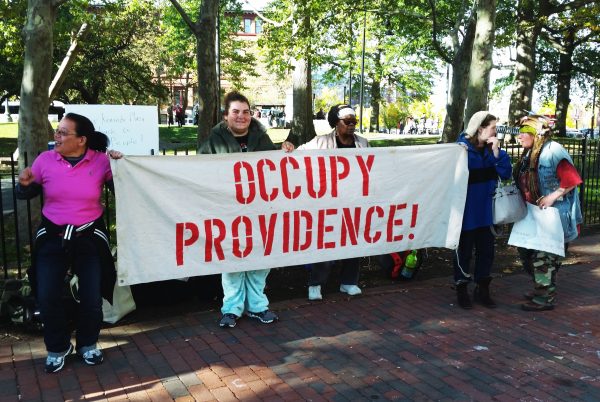 A protest organized by Occupy Providence and supported by RIPTA Riders Alliance was held in Burnside Park Saturday against plans by downtown building owners and allied politicians to push out buses and homeless people from the Kennedy Plaza area. October 15 marks the 5th anniversary of Occupy Providence. “We oppose the damaging idea of moving the state’s bus hub to a worse location far from downtown, and pushing people without homes into other parts of Providence without adequate services,” said the group in a statement, “We also oppose efforts by downtown owners to assert more control over the Kennedy Plaza area to the detriment of others.”
A protest organized by Occupy Providence and supported by RIPTA Riders Alliance was held in Burnside Park Saturday against plans by downtown building owners and allied politicians to push out buses and homeless people from the Kennedy Plaza area. October 15 marks the 5th anniversary of Occupy Providence. “We oppose the damaging idea of moving the state’s bus hub to a worse location far from downtown, and pushing people without homes into other parts of Providence without adequate services,” said the group in a statement, “We also oppose efforts by downtown owners to assert more control over the Kennedy Plaza area to the detriment of others.”
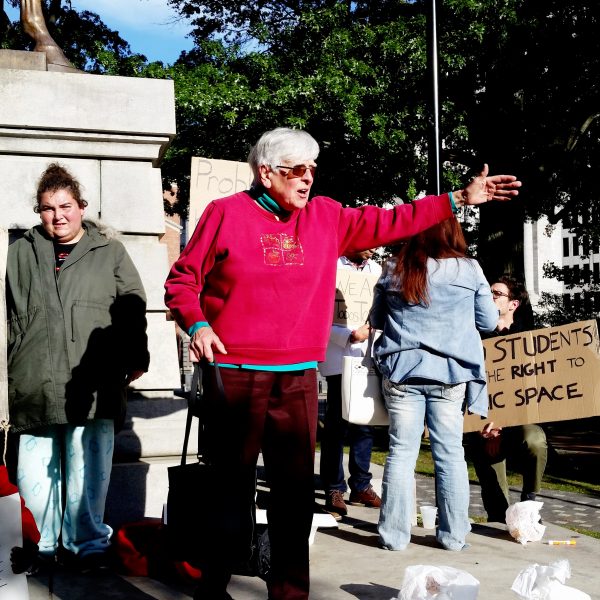
As is the tradition at Occupy, the event took the form of an open microphone, where anyone was invited to stand up and address their concerns and ideas to the crowd. A sampling of the speakers is presented blow. Technical difficulties marred the video, but the audio is clear.
People spoke about the issues surrounding homelessness, the persecution of panhandlers, and the increase in the bus fares that will be impacting the most vulnerable come January. Three student from the Alpert Medical School at Brown University attended, arguing that public transportation is a health issue.
Randall Rose, a member of Occupy Providence, said, “The Kennedy Plaza area should be kept safe for everyone, and not put under the sway of a few owners who want to use their insider connections to make more money from a more tightly restricted downtown.”
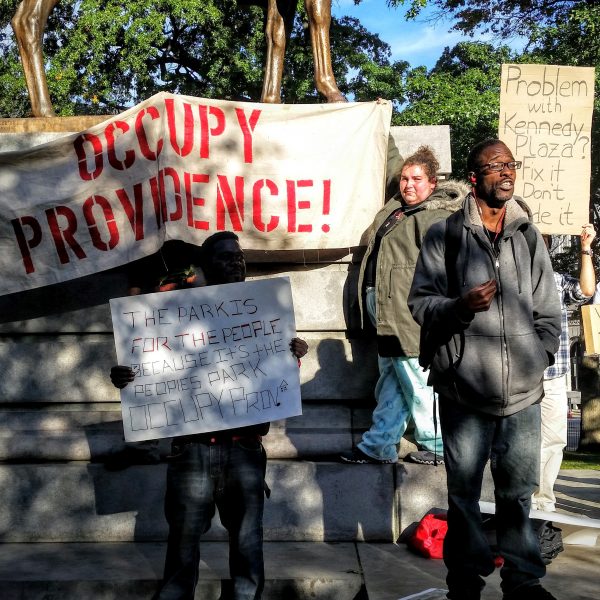
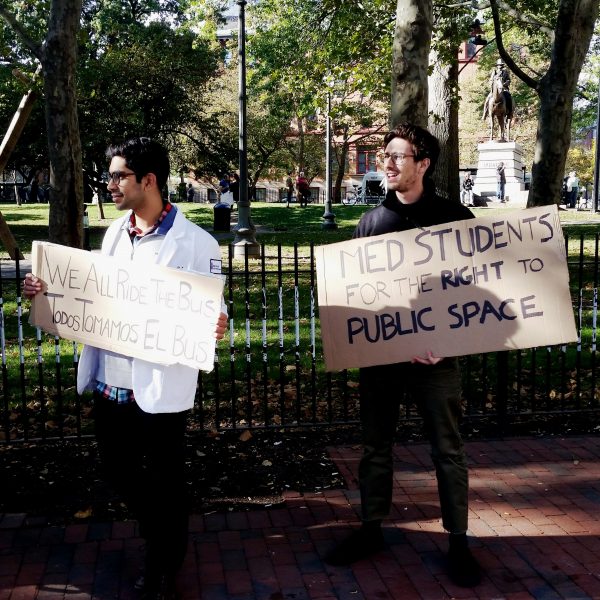
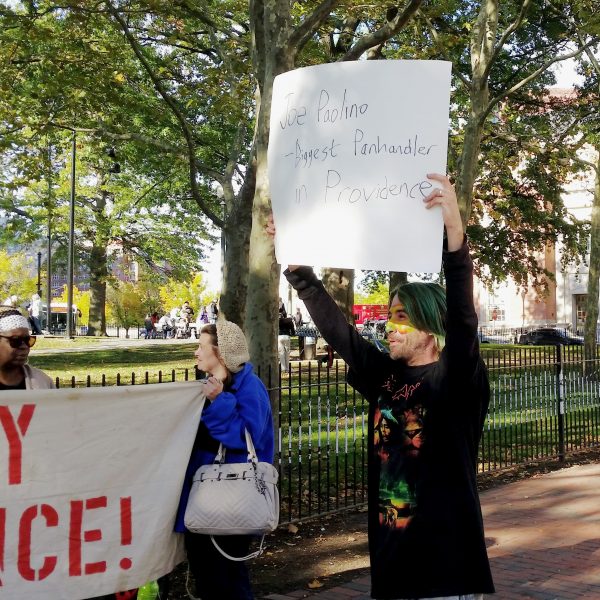
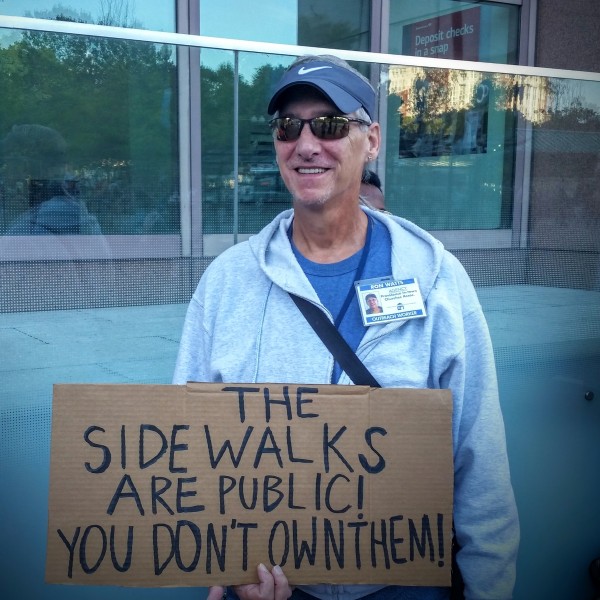
Lost in yesterday’s coverage of real estate investor Joseph Paolino‘s roll out of the Providence Downtown Improvement District‘s (DID) plan to deal with the issue of panhandling (and homelessness) in downtown Providence was the introduction of an alternative plan by committed homeless and poverty activists that took place across from Kennedy Plaza at Paolino’s property “The Shops at 100.”
The Rhode Island Homeless Advocacy Project (RIHAP), Homeless Bill of Rights Defense Group and DARE (Direct Action for Rights and Equality) presented a comprehensive plan called “Reclaiming Our Public Spaces.”
The group presented recommendations in three major areas:
- Promoting Community and Economic Development
- Discontinuing Current Criminalization Policies; and
- Supporting Social and Human Service Needs.
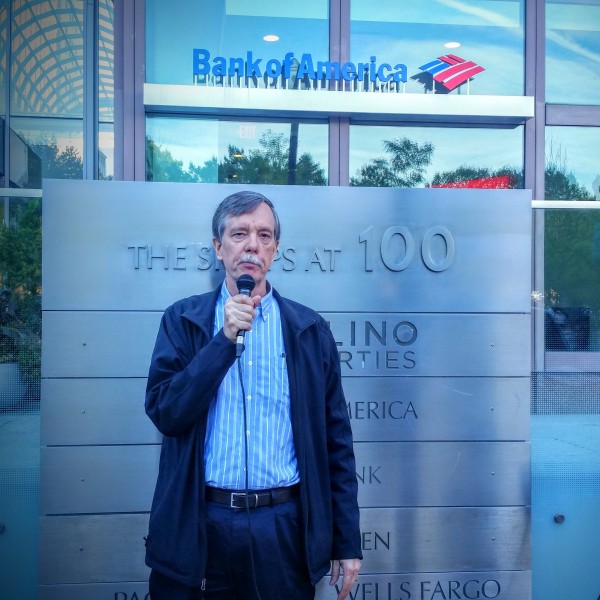
The advocates sought to differentiate their ideas from those to be presented by Paolinio. Dr. Eric Hirsch, Professor of Sociology at Providence College and a member of the Homeless Bill of Rights Defense Committee pointed out that Paolino’s proposals were akin to the flawed “broken windows” policies that have been discredited around the country. The “broken windows” policies were based on an idea that allowing minor offenses like littering, panhandling, loitering, or washing car windshields was an open invitation for more serious crimes. They argued that these “broken windows” were the real reasons for the rise of violent and serious property offenses.
“The problem with basing policy on this “broken window” idea is that there was no evidence to back it up,” stated Hirsch. “Unfortunately, although the idea has been completely discredited, police departments and city officials around the country continue to base policy decisions on this flawed proposal.”
“Criminalization is not a solution to homelessness,” added Roger Williams University School of Law Professor and Assistant Dean Andrew Horwitz. “It is incredibly cruel to those experiencing homelessness, dehumanizing the individuals and making it harder to connect to advocates and services. It also costs the system more by spending taxpayer dollars on court costs and incarcerations rather than on housing, medical care, and other long-term solutions.”
Key findings/conclusions from the report are:
- Homeless people are criminally punished for being in public even when they have no other alternatives
- The criminalization of homelessness is increasing across the country
- Criminalization laws violate the civil and human rights of homeless people
- Criminalization laws are costly to taxpayers
- Criminalization laws are ineffective; and
- Criminalization laws should be replaced with constructive solutions to ending
- homelessness.
“Rhode Island has the potential to be a model for how to end homelessness,” concluded Barbara Freitas, Director of RIHAP. “We can do this by collaborating to provide safe, affordable, permanent housing and engaging with and educating our community. It is not done by harassing and further marginalizing our city’s most vulnerable neighbors.”
Here’s the video from their press conference:
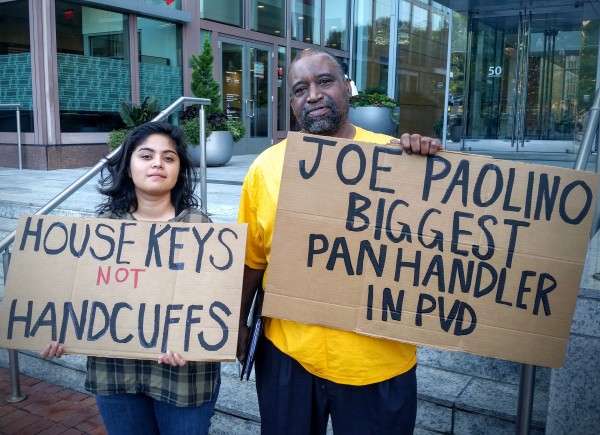
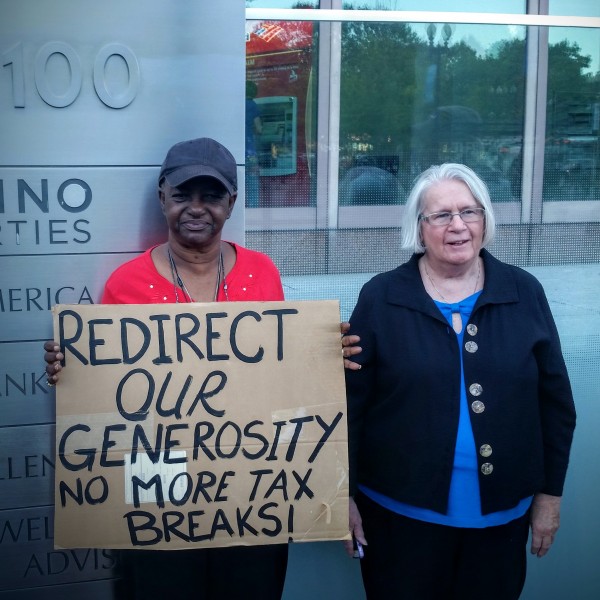
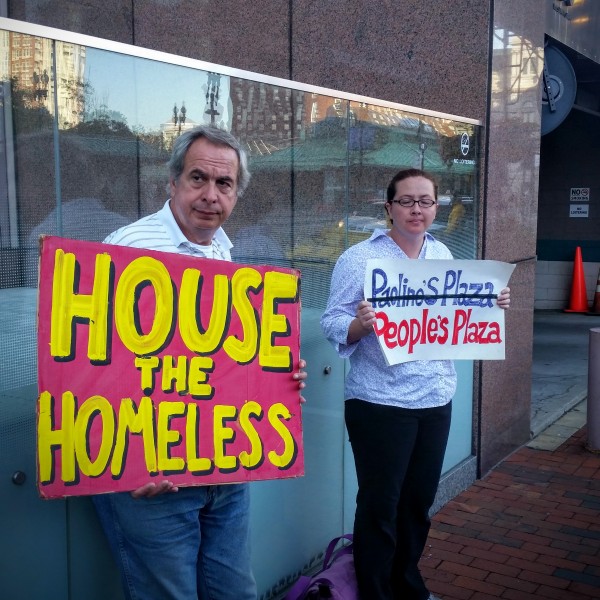
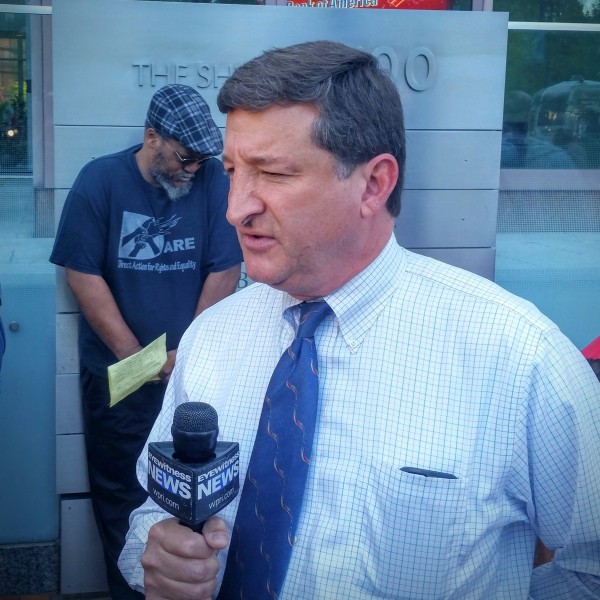
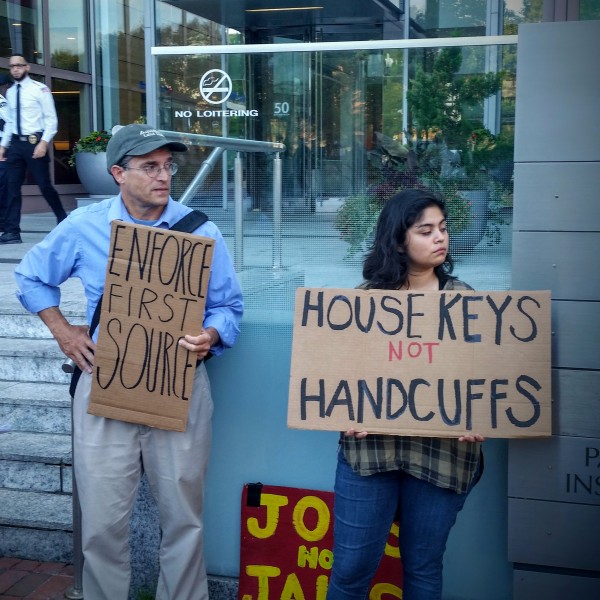
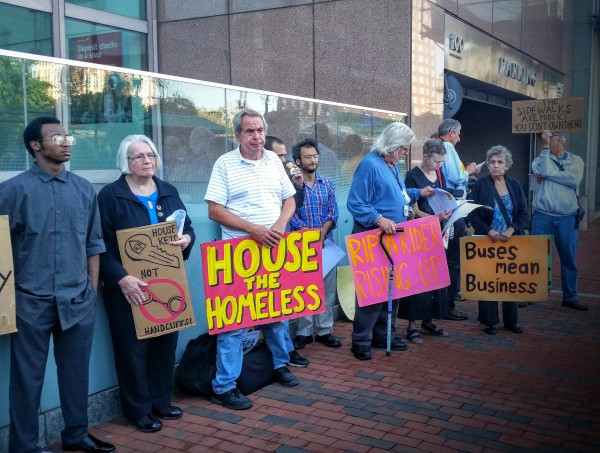
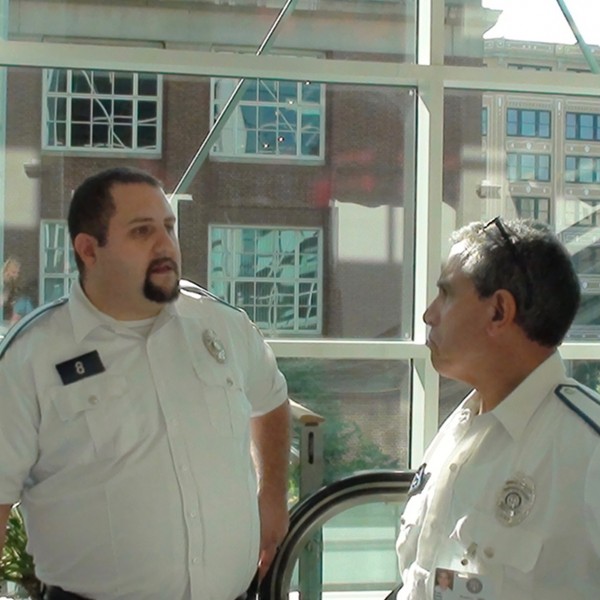 On Wednesday morning, reporters and activists were prevented from attending real estate developer Joseph Paolino’s press conference where he was to announce his plans regarding the issue of homelessness. The behavior of the security guards and police officers at the Providence Convention Center, where the press conference was held, became a preview of what many fear might become the norm if the wrong policies are instituted in downtown Providence.
On Wednesday morning, reporters and activists were prevented from attending real estate developer Joseph Paolino’s press conference where he was to announce his plans regarding the issue of homelessness. The behavior of the security guards and police officers at the Providence Convention Center, where the press conference was held, became a preview of what many fear might become the norm if the wrong policies are instituted in downtown Providence.
As activists and reporters entered the convention center, a security guard raised his hand and stopped everyone cold. “I don’t know where you guys are trying to go,” said the guard, “but I can’t let you guys go anywhere.”
A Providence police officer added that only “designated” people were allow to go up to the fifth floor where the press conference was taking place. It became quickly apparent that the activists and some reporters were not the “right kind of people” for the exclusive press conference.
Calls upstairs to the people in charge were useless. It didn’t matter to the convention center security guards or to the police officers that reporters and city residents were being denied access to a public meeting pertinent to their lives. What mattered, it seemed, was how one was dressed, who you knew, and how security perceived you.
People who were dressed in nice suits and ties, wearing nice clothes and carrying briefcases – or, let’s face it, white and upper class people – were allowed access. If you didn’t fit that bill, you were stopped in the lobby.
WPRO reporter Anita Baffoni was allowed upstairs with another woman who claimed she was a reporter, but RI Future’s Bob Plain was denied. Security claimed that the women had “credentials.” This is a matter in dispute.
Soon, people came downstairs from where the press conference was taking place and started approving some people and turning down others. Again, this was done either from familiarity, i.e. people in positions of authority recognizing each other, or through profiling along racial and class lines.
“It’s a private meeting,” said a man, who suddenly seemed in charge. “We’re trying to treat everyone like ladies and gentlemen,” he said. I countered that he was treating people like “second-class citizens” but he doubled down, saying that that “was absolutely not true.”
Some people were allowed to take the escalator without having so much as a single word or objection from security lobbied at them. These people were white and dressed nicely. For others it became necessary to storm past security and risk arrest if they wished to attend the press conference.
Convention center security eventually admitted that they couldn’t accost people. That didn’t stop them from threatening arrest. The Providence Police who were present were not arresting people, however, even when some activists made it all the way up to the fifth floor and began chanting outside the room where Paolino was holding court.
Is this the future for Kennedy Plaza? Access for some, as long as they look rich and white and have the right connections, while others become subject to ruthless regulations meant to keep us always on the edge of arrest?
Ordinances, such as “banning the distribution of anything to occupants of vehicles” are being proposed to the Providence City Council and being seriously considered. The ACLU’s Steve Brown calls this proposed ordinance “a direct attack on individuals who are struggling with homelessness or poverty and who seek to peacefully exercise their First Amendment rights to solicit donations.”
To his credit, Paolino said that restricting access to some reporters was inadvertent. He said he had no intention of preventing RI Future, the Providence Journal, RINPR and the Providence Business News from attending. But he did want to keep the activists and protesters away. He didn’t want his press conference disrupted.
When we hide our public meetings and press conferences behind security guards and police officers, restricting access to only the “right” people and the proper, embedded media, we set up a system that respects the rights of the rich over the rights of the poor. We set up a two tiered class system of the kind that lifts up some people by stepping on others.
Not unlike what some people would like to see in Kennedy Plaza.
]]>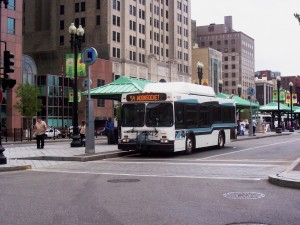 I saw my friend Jeff yesterday morning, on the way to his morning workout at the YMCA. Jeff is confined to a wheelchair, and uses RIPTA to get to the East Side Y most mornings. We chatted for a few minutes while we got on the same bus and shared it through the bus tunnel.
I saw my friend Jeff yesterday morning, on the way to his morning workout at the YMCA. Jeff is confined to a wheelchair, and uses RIPTA to get to the East Side Y most mornings. We chatted for a few minutes while we got on the same bus and shared it through the bus tunnel.
Because I commute via RIPTA, I walk through Kennedy Plaza pretty much twice a day, every day. In a couple of decades of riding the bus, early, late, middle of the day, I have never felt unsafe in the plaza. Now and again I’ve been asked for change, which I decline to give, and once or twice I’ve been offered bags of drugs, which I decline to buy. I’ve occasionally seen loud arguments and even a couple of altercations, but they were not my arguments and altercations. People loiter, but after all, how different is that from me waiting for my bus? I see other people carrying on their lives in the Plaza, just as I’ve shared the bus with some people for years, and am familiar with a little slice of their lives. Their lives are not mine, so we coexist, but seldom interact.
Joe Paolino talks blithely about moving the buses to the Peter Pan station, or to Allens Avenue. He can do that because he never takes the bus, but has a driver to drop him off wherever he wants to go. If he gets what he wants, the rest of us who do not enjoy that luxury will have longer commutes, get wetter when it rains, and miss connections, in service of enhancing the value of his property.
Does anyone beside me remember the people who used to hang around the Fogarty building on Fountain Street in downtown Providence when the unemployment office was in it years ago? I’m not so old that I could possibly be the only one, am I? Or at the bus station on Sabin Street before that? What about the people who would crowd around Travelers Aid (now Crossroads) off Westminster? The bus station, Crossroads, and the unemployment offices have all been moved out of downtown, to keep “those people” away.
Now city leaders have set their sights on RIPTA, suggesting that the bus system is somehow a magnet for poor people and thus a threat to an upscale downtown, just like those other magnets. This is a familiar tune, but why do we keep singing it? Paolino himself was the mayor who presided over moving the bus station from Sabin Street to its current remote location off I-95 back in the 1980s. Did that help? Moving these other supposed magnets out of downtown has not worked in the past. Why should anyone imagine it will do the trick this time?
The problem in Kennedy Plaza is not RIPTA, and pretending so will not solve anything, but only cause hardship and inconvenience to people whose lives are already marked by hardship and inconvenience. The problems are social problems of drugs, poverty, and homelessness, unmasked by the evacuation of workers from downtown. Abetted by state policy, and with transportation to downtown increasingly less convenient (RIPTA cutbacks anyone?), banks, law firms, and other commerce has left downtown. The state itself has removed hundreds of its employees, too. The poor people who congregate in Kennedy Plaza are not new; they are just the ones left behind.
Back before the state decided to evacuate its workers from downtown, there was a substantial presence downtown by social service agencies. In service of enhancing property values and chasing away the poor people who they “attracted”, those agencies were moved out of downtown. Now there is little or nothing downtown to help people who need it, but the people are still there. How strange.
Moving these problems out of the center of town will not make them go away, but only allow our civic leaders to pretend they do not exist. Do we want to solve those problems, or just ignore them? Wait, don’t answer that.
]]>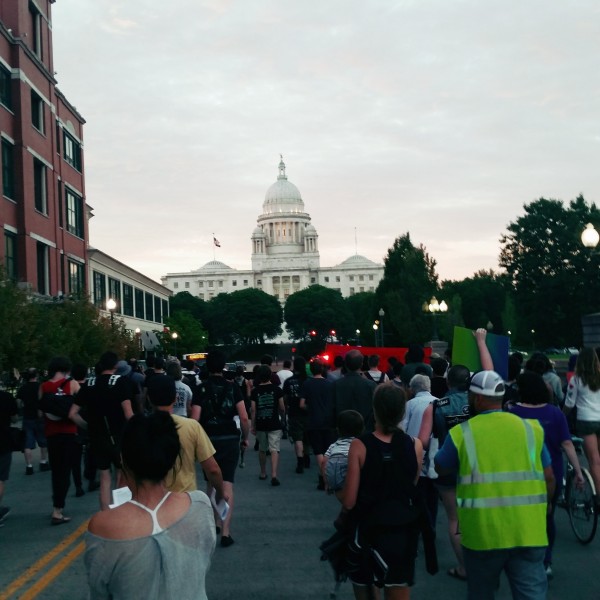 A march from Kennedy Plaza to the Providence Public Safety Complex, with a brief, tense stop in front of the Providence Place Mall was held in Providence Friday evening in solidarity with a National Prison Strike, on the 45th anniversary of the Attica Uprising.
A march from Kennedy Plaza to the Providence Public Safety Complex, with a brief, tense stop in front of the Providence Place Mall was held in Providence Friday evening in solidarity with a National Prison Strike, on the 45th anniversary of the Attica Uprising.
After gathering in Kennedy Plaza, across from Providence City Hall, the march headed for the Providence Place Mall, where it came to a stop, blocking one direction of traffic. Providence Police, lead by Lt. Oscar Perez, had until this time been clearing traffic ahead of the march, but here, with traffic stopped, there was a tense five minutes where a threat of arrest seemed imminent. No arrests took place.
Still, many of the participants felt the police showed their hand in front of the mall. At the Providence Public Safety Complex, after the march, a speaker maintained that though the police were saying that they were “trying to keep us all safe… the second we stopped at the mall… we were threatened with arrest… Safety goes out the window when it comes to capital. They’re here to protect and serve, just not us. They’re here to protect fucking capital.”
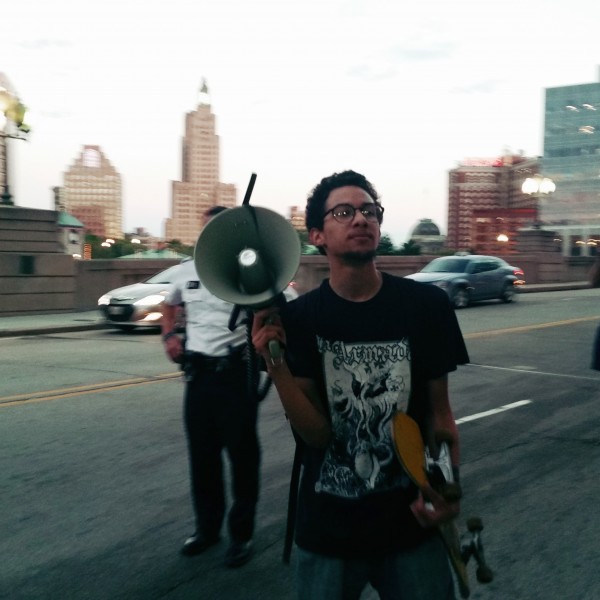 On my way back to Kennedy Plaza after the event Lt. Perez told me, half jokingly, that “those kids kind of hurt my feelings.”
On my way back to Kennedy Plaza after the event Lt. Perez told me, half jokingly, that “those kids kind of hurt my feelings.”
The problems with capitalism, though, is one of the points this strike and the supportve march is trying to make. As the march organizers say on their event page, “Slavery is legal in America. Written into the 13th Amendment, it is legal to work someone that is incarcerated for free or almost free. Since the Civil War, tens of millions of people – most arrested for non-violent offenses – have been used as slaves for the sake of generating massive profits for multi-national corporations and the US government. Today, prison labor is a multi-billion dollar industry which helps generate enormous wealth for key industries such as fossil fuels, fast food, telecommunications, technology, the US military, and everyday house hold products…
“This is not just a prison strike for better wages or conditions, it is a strike against white supremacy, capitalism, and slavery itself.”
This is the context for the stop at the mall. The mall sells products made by prison labor. Not paying prisoners wages for the work they do, or paying them a fraction of what workers outside prisons make, depress the wages of everyone. The slavery system of prison labor has real consequences for everyone, especially the poor and marginalized, who are often only one bad day away from being in prison themselves.
Nationally, the strike is being led by groups such as the Free Alabama Movement, Free Texas Movement, Free Ohio Movement, Free Virginia Movement, Free Mississippi Movement, and many more. Locally, the march was organized by the Providence chapter of the IWW Incarcerated Workers Organizing Committee [IWOC].
The strike is certainly not a one day event. Today, at the Adult Correctional
For more information:
Let the Crops Rot in the Field
Incarcerated Workers Take the Lead
Here’s video from the speak out:
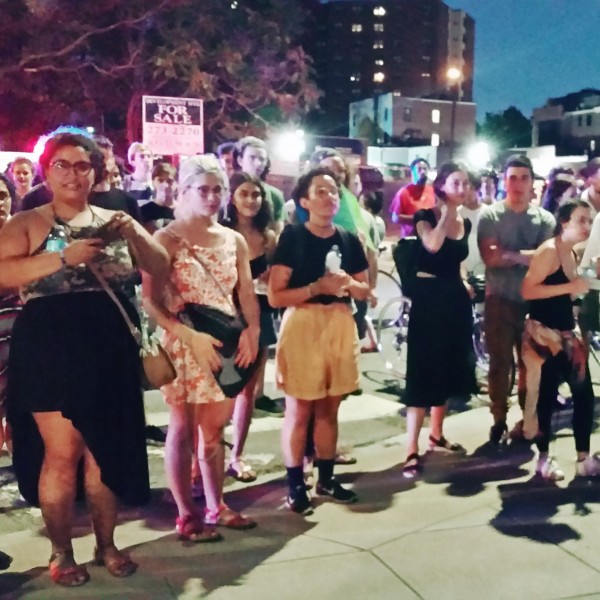
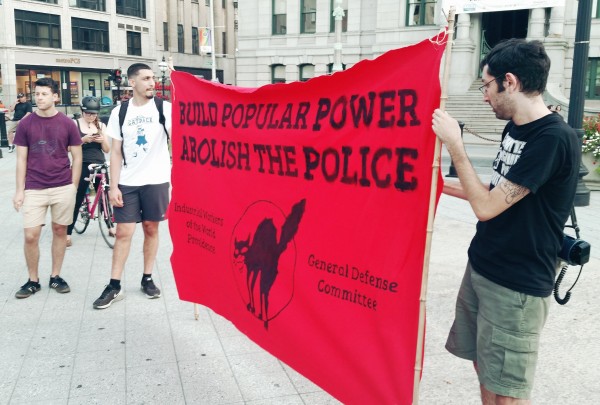
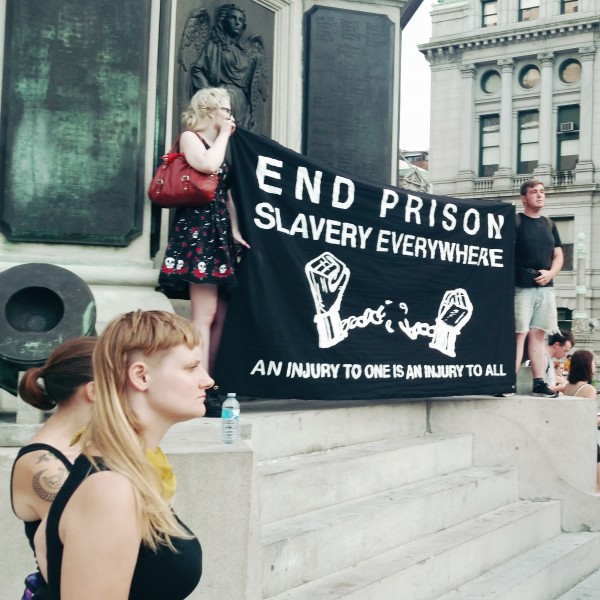
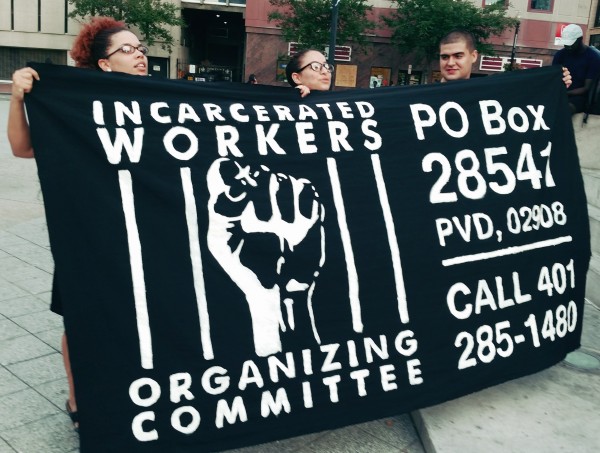
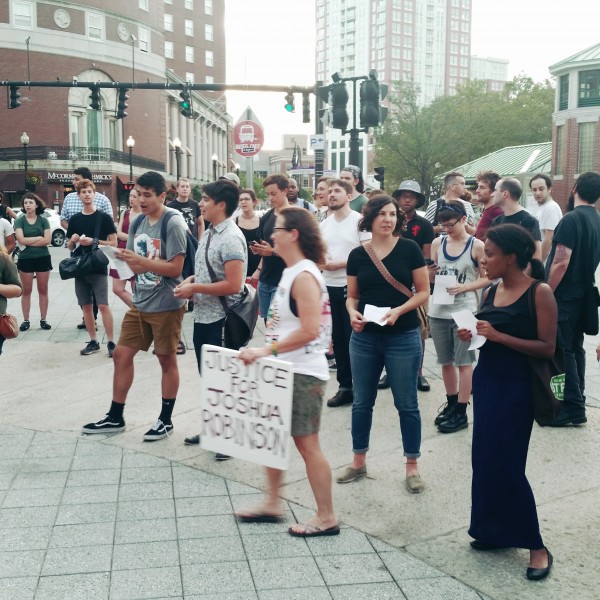
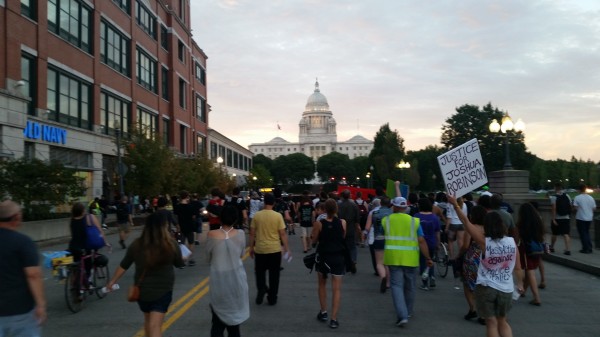
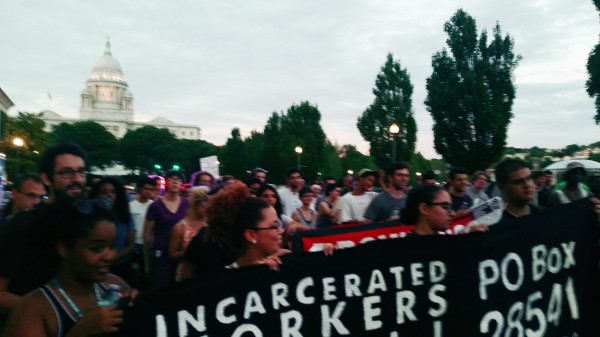
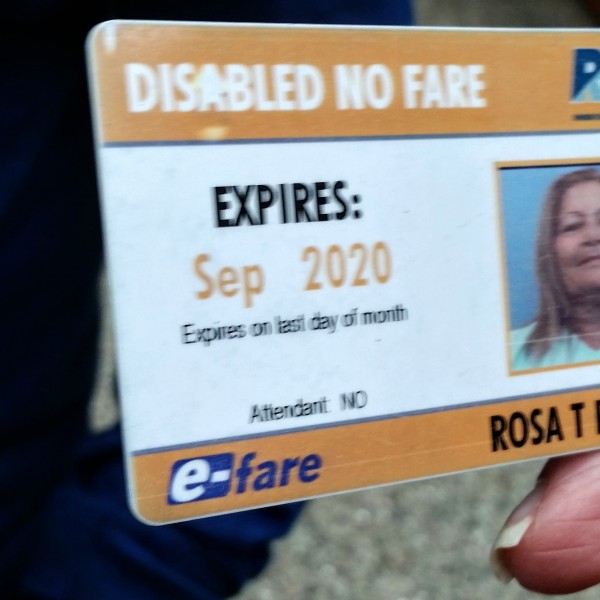 Rosa was waiting near the end of a line of about 30 people when I found her at 8:30am in the Kennedy Plaza terminal building Wednesday morning. In her hand she held a senior/disabled bus pass that was due to expire in September 2020, but a driver told her that the pass was no good anymore and that she had to get a new bus pass if she wanted to continue to ride at the reduced fare.
Rosa was waiting near the end of a line of about 30 people when I found her at 8:30am in the Kennedy Plaza terminal building Wednesday morning. In her hand she held a senior/disabled bus pass that was due to expire in September 2020, but a driver told her that the pass was no good anymore and that she had to get a new bus pass if she wanted to continue to ride at the reduced fare.
“I paid for this pass, and now it’s no good and I have to pay again,” said Rosa.
Barbara Polichetti, Director of Public Affairs at RIPTA (Rhode Island Public Transit Authority) said that, “Individuals who obtained their passes before January 1, 2013 will be required to pay $10 for their new passes. Anyone who obtained their pass after January 1, 2013 will still need to re-qualify but will not have to pay the $10 processing fee.”
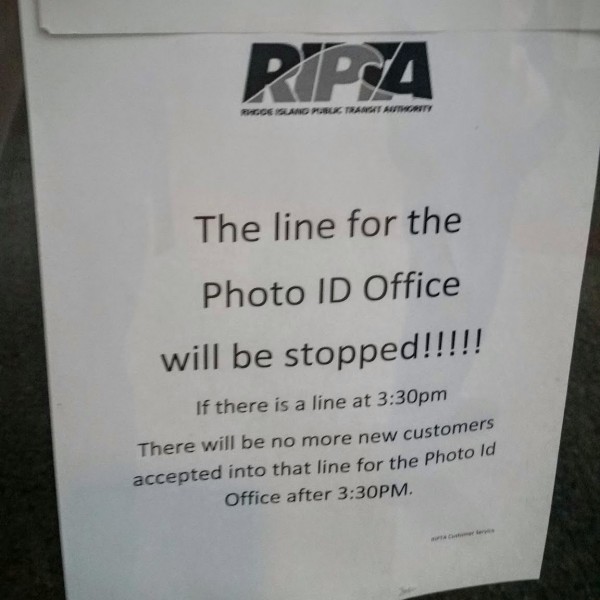 Further up the line Frederick, a disabled man in his late thirties, told me that he had waited in line for over two hours the day before. “They cut off the line at ten people, and told the rest of us to come back tomorrow,” he said. He added that it is difficult for him to get around without a bus pass.
Further up the line Frederick, a disabled man in his late thirties, told me that he had waited in line for over two hours the day before. “They cut off the line at ten people, and told the rest of us to come back tomorrow,” he said. He added that it is difficult for him to get around without a bus pass.
RIPTA announced back in April that they were “re-qualifying all passengers eligible to participate in RIPTA’s Reduced Fare Bus Pass Program for lower income senior citizens and persons with disabilities.” All participants were then required to obtain new passes by July 1. That deadline was later extended to September 1.
I asked Polichetti why re-qualification became necessary. “We looked at all aspects of this program as part of the Comprehensive Fare Study that was conducted last year. In addition to looking at fares, or in this case our no-fare customers, we also looked at the administration of the program. It became very clear that having passes that were valid for five years at a time was not practical or prudent – it was simply too long to go without having people check back in to see if they still qualify for the program.
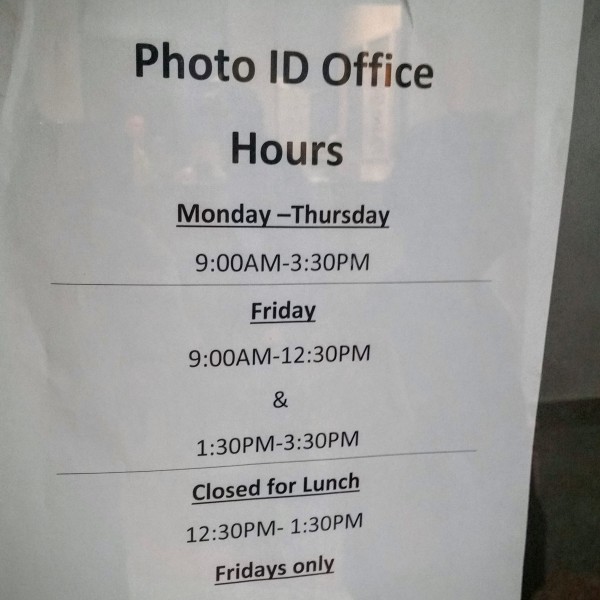 “There was no way to determine if a pass holder had died or moved away; their passes remained active and in use in our system until they expired. So we knew we needed to lessen the time the passes are valid. They will now be valid for two years, not five. The passes being issued now will expire on a customer’s birthday after the two-year mark, so everyone will not have to re-qualify at the same time again – it will be staggered.”
“There was no way to determine if a pass holder had died or moved away; their passes remained active and in use in our system until they expired. So we knew we needed to lessen the time the passes are valid. They will now be valid for two years, not five. The passes being issued now will expire on a customer’s birthday after the two-year mark, so everyone will not have to re-qualify at the same time again – it will be staggered.”
Originally senior and disabled bus riders were facing a $.50 price hike, but that increase was put off until January, when the General Assembly might reconsider the fare increase.
“We are sensitive to the fact that this program serves a population that is facing financial, health and other stressors in their lives,” said Raymond Studley, RIPTA’s CEO in June when the extension was announced.
That population includes Alan, who first got in line for a new pass on August 31. He was told that he lacked the proper paperwork. It took him a while to get what he needed from the IRS. I wasn’t sure that the one paper he had in his hand would be enough, but Alan seemed confident.
RIPTA’s outreach to the public about the program changes has been extensive, said Polichetti, and has included distributing information at charitable organizations and senior centers across the state, running radio ads for five months, and posting reminders on its website, social media and the digital boards on buses and at the Kennedy Plaza transit hub.
Still, many senior and disabled people didn’t get the message until a bus driver informed them that their pass was no good. Jose, who was waiting in line with Rosa, doesn’t speak much English and his pass didn’t expire until May 2019. He was visibly annoyed that his pass was invalid, despite the date printed on it.
“A lot of riders thought that at the last minute the governor would have a change of heart and decide to honor the passes until they expired,” said Don Rhodes, president of the RIPTA Riders Alliance. So why didn’t RIPTA grandfather in people like Jose and Rosa, who have passes that won’t expire for a few years?
“Since one of the goals was to end the five-year tenure of the passes for better administration of the program,” said Polichetti, “this would not have worked. It would have meant that some people were still going to have five years without checking in with RIPTA, five years without us verifying that they still qualify for the program, and that they are the rightful pass holder.
“We tried to minimize the financial impact of the re-qualification process by not charging anyone who received a pass after Jan. 1, 2013 for their new passes. The fee – which is the administrative fee for getting a photo ID pass – remains the same at $5 per year. The new two-year passes are $10.”
Mary waited in line on Tuesday from 1pm to 3:30pm, only to be told to go home and come back tomorrow. She had spent Tuesday morning at the DMV, getting her state issued ID, and then spent hours in vain at RIPTA. It was a long day of waiting in line, with tons of other people, and she didn’t get the bus pass she needed.
“It was crazy in here yesterday,” said Mary, “It was nuts. The line was over twice as long, and stretched around the room and outside into the rain.”
Hopefully Mary will have better luck today, since she arrived an hour before the office opened.
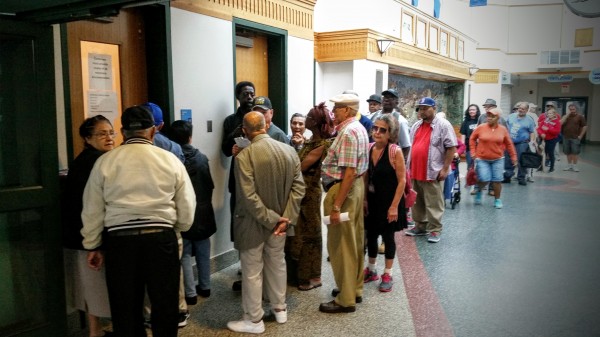
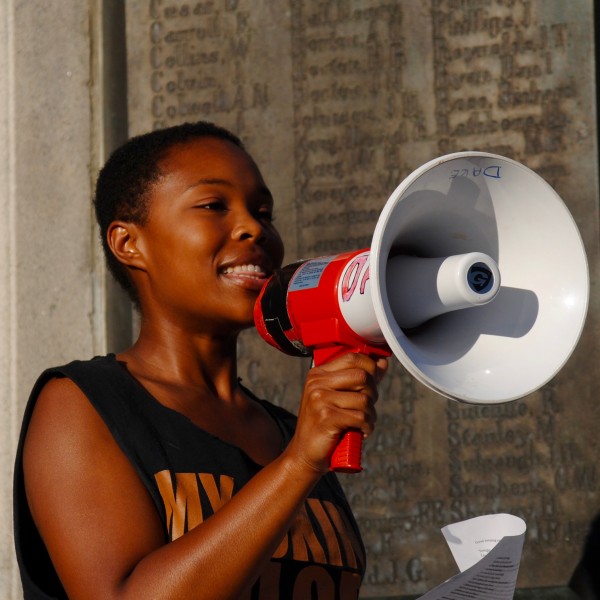
The Providence City Hall Council Chamber was packed over capacity. The crowd was so raucous and loud it was hard to hear the speakers on their microphones.
“I Sabina Matos, would like to pass the Community Safety Act.”
“Seconded.”
Voice after voice pledged their support for the Community Safety Act.
“I, Seth Yurdin, would like to pass the Community Safety Act.”
“I, Sam Zurier, would like to pass the Community Safety Act.”
The Community Safety Act (CSA) passed unanimously. Not a single voice spoke against it. The City Council Chamber erupted in cheers and applause.
It was a brilliant moment.
But the Providence City Council never actually voted. Minutes before the City Council was to begin their meeting, their last meeting before taking a break for vacation, hundreds of protesters in support of Black Lives Matter had crossed the street from Kennedy Plaza and entered the chamber en masse. They took the seats of city councillors and acted out what passing the CSA might look like.
The CSA never passed. It has only recently been scheduled for consideration, when the City Council comes back in September.
As the crowd filed out of the chamber, Nick Katkevich of the FANG Collective asked a just arriving City Councillor Seth Yurdin if he would really support the CSA when the time came.
“I don’t support the CSA,” said Yurdin.
Neither does Providence Mayor Jorge Elorza or Public Safety Commissioner Steven Paré.
Fifteen minutes earlier crowds gathered at Kennedy Plaza, across the street from City Hall. The Movement for Black Lives had called a nationwide, July 21 Collective Action for Freedom, in response to the recent slew of high profile police killings. In Providence, the action was organized by the Step Up Coalition to Pass the Community Safety Act and the White Noise Collective RI around the idea of supporting the CSA.
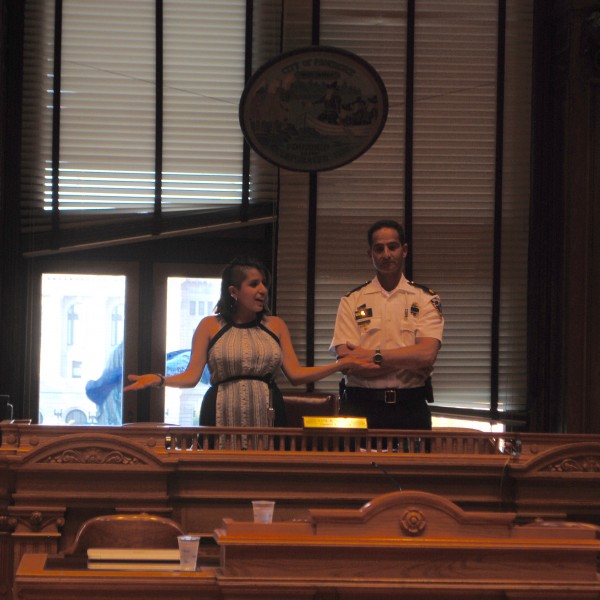
The proposed Providence ordinance has 12 key points pertaining to police interactions with community members, including providing interpretation, documenting traffic stops in a standardized manner, and limiting police collaboration with other law enforcement agencies such as ICE. The CSA would also reestablish the Providence External Review Authority (PERA) with the power to recommend that Public Safety and Police Department budgets be reapportioned to youth recreation and job training programs.
“We don’t want to compromise on the safety of our community. When you have women dying in jail because they didn’t use a turn signal or youth being shot in cold blood for having toy guns in an open carry state, we can’t compromise,” said Community Safety Act Campaign Coordinator, Vanessa Flores-Maldonado. “We need police accountability now because no one feels safe in our community.”
The campaign recently scored a win when organizers secured a public hearing for the CSA at the beginning of September. The “mock hearing” was organized to put additional pressure on the City Council to pass the CSA.
At the mock hearing, Flores -Maldonado spoke directly to the city council members present, including Council President Luis Aponte, saying that the city council should listen to what the people had to say.
The protest left city hall and marched up Washington St towards the Providence Public Safety Complex, where people gave a series of speeches in support of the CSA, hiring more teachers of color, community defense, and abolishing the police. Here the speeches were in turn thoughtful and emotional. I would recommend them to those seeking a better understanding of these issues.
After leaving the public safety complex the march continued on to Cathedral Square, where there was some last words before the march disbanded.
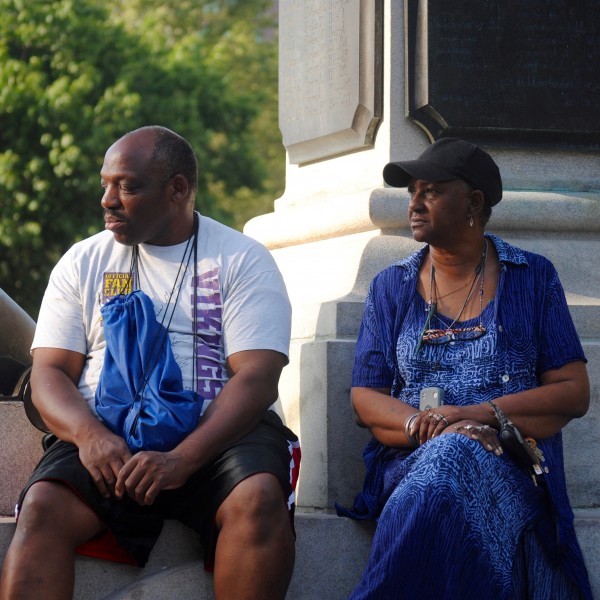
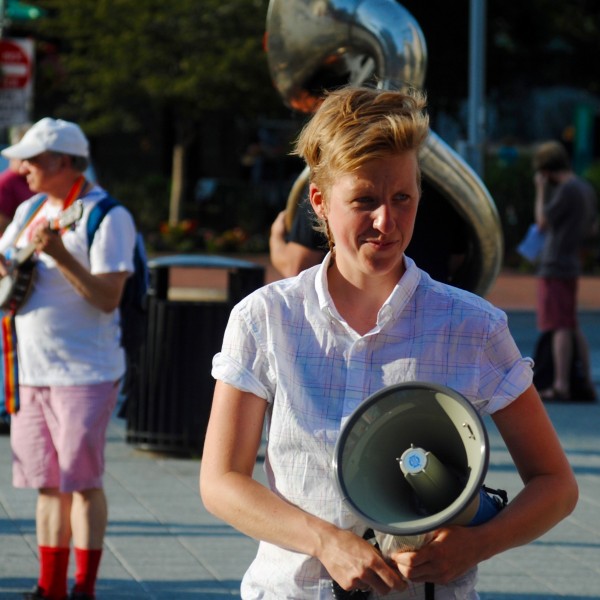
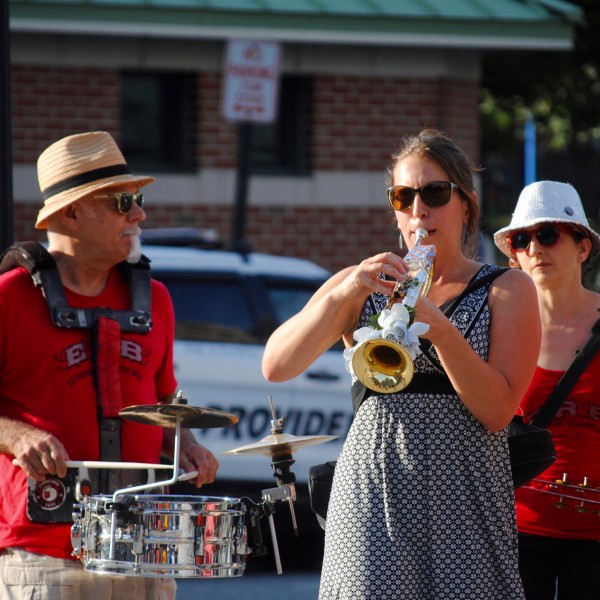
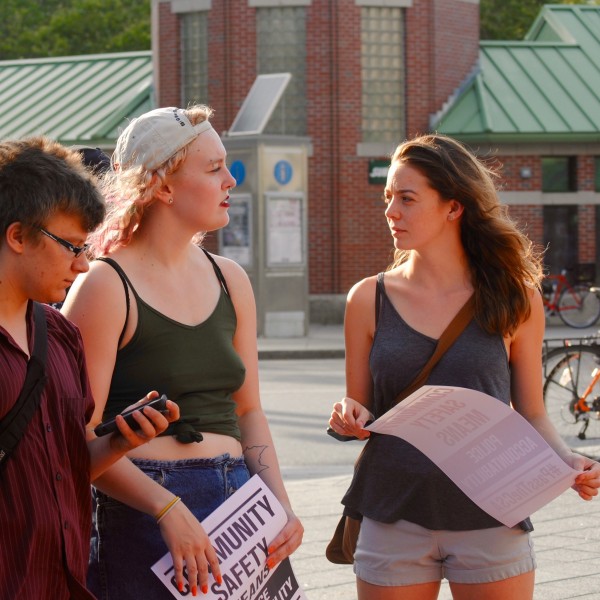
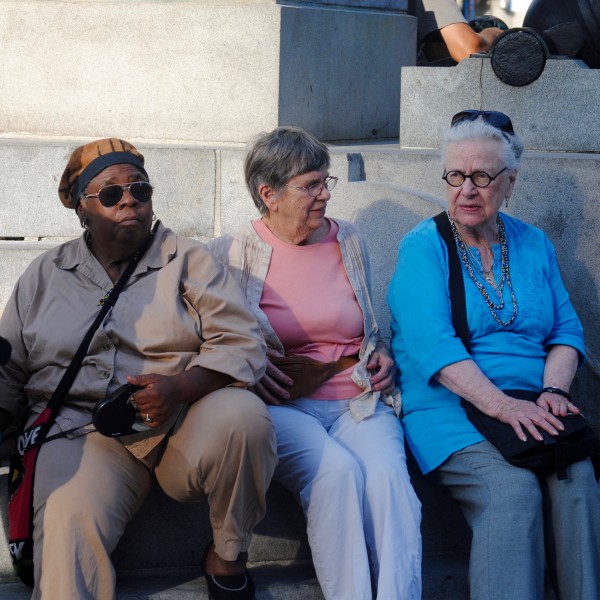
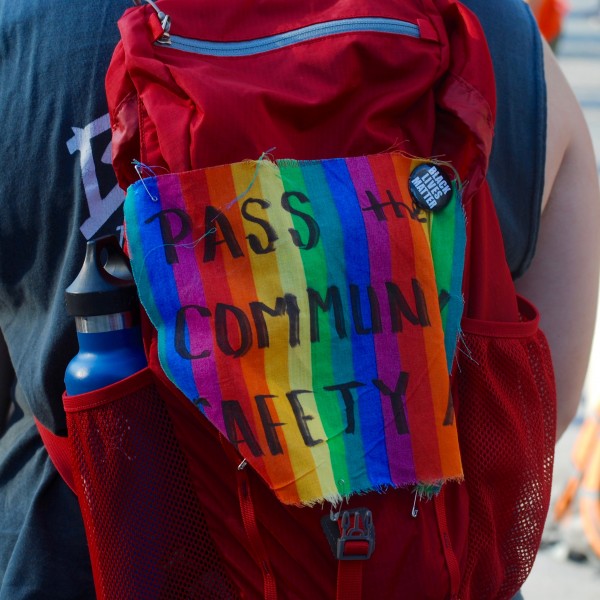
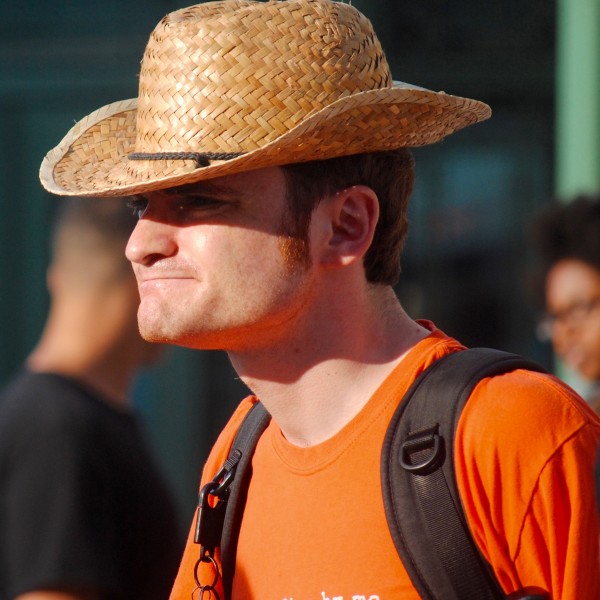
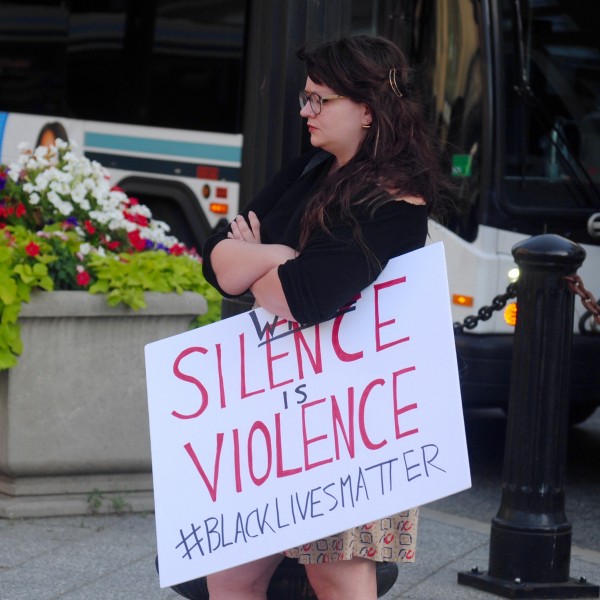
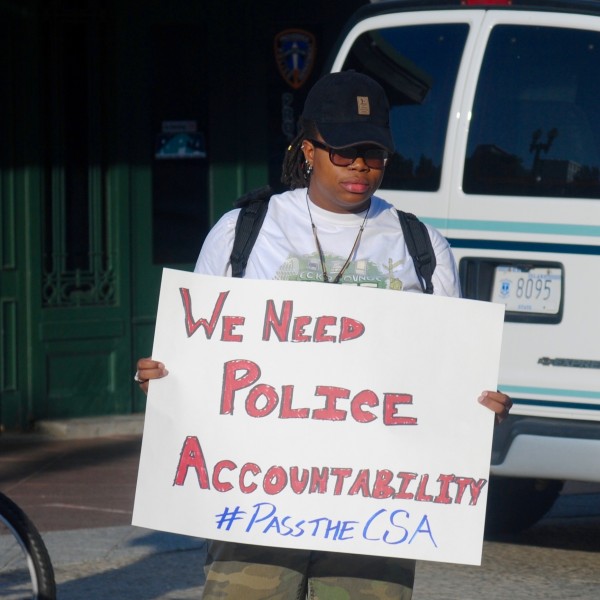
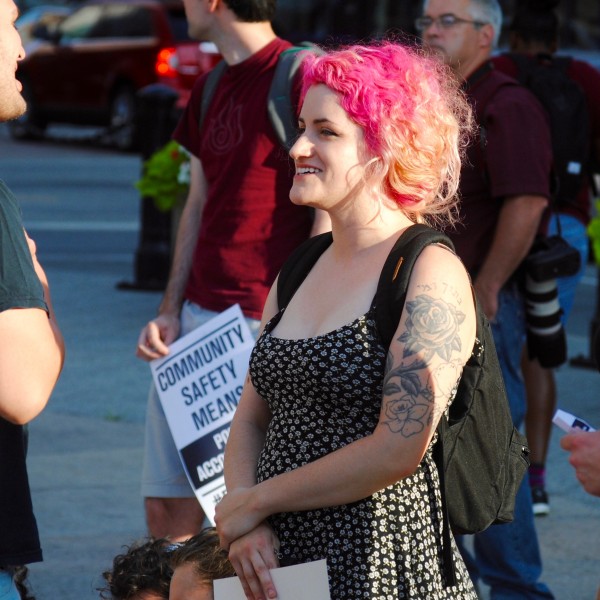
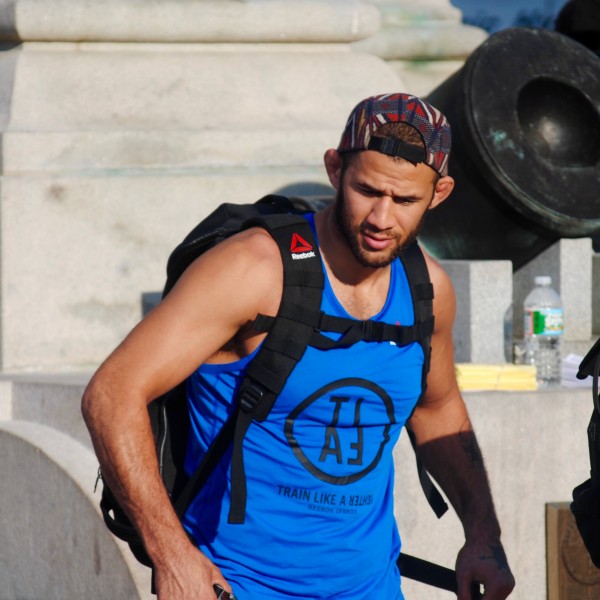
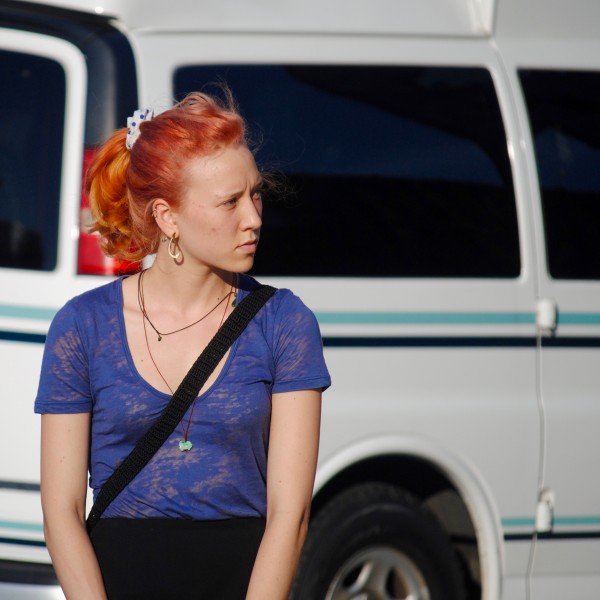
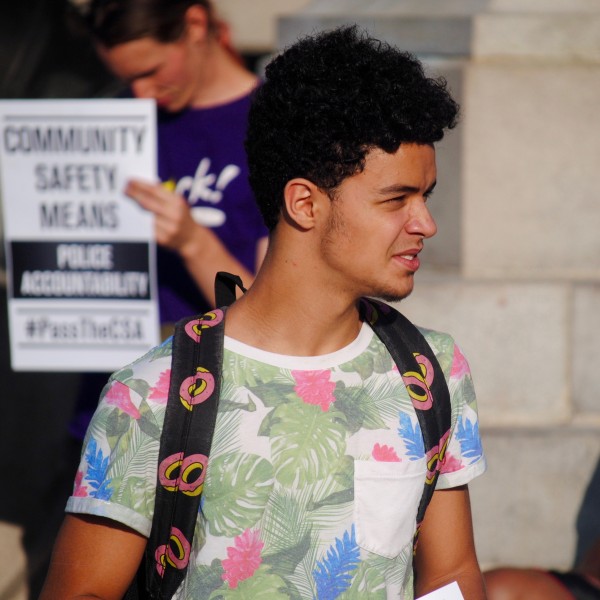
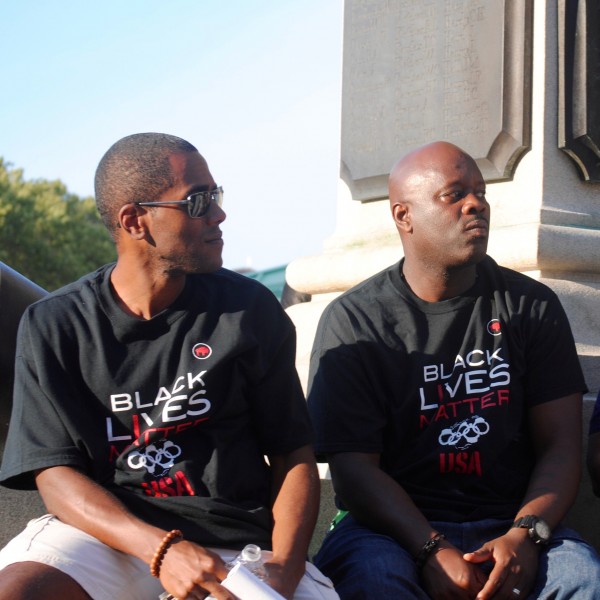
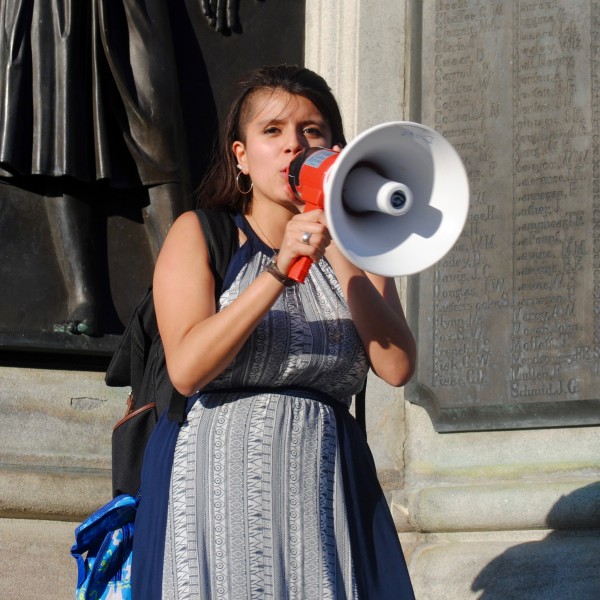
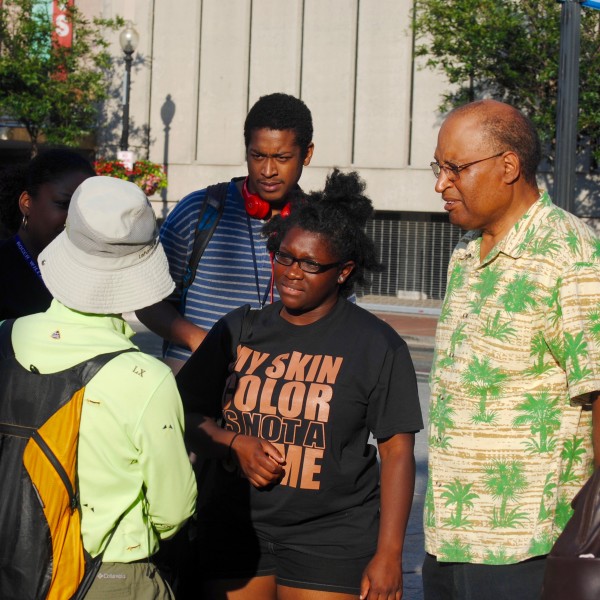
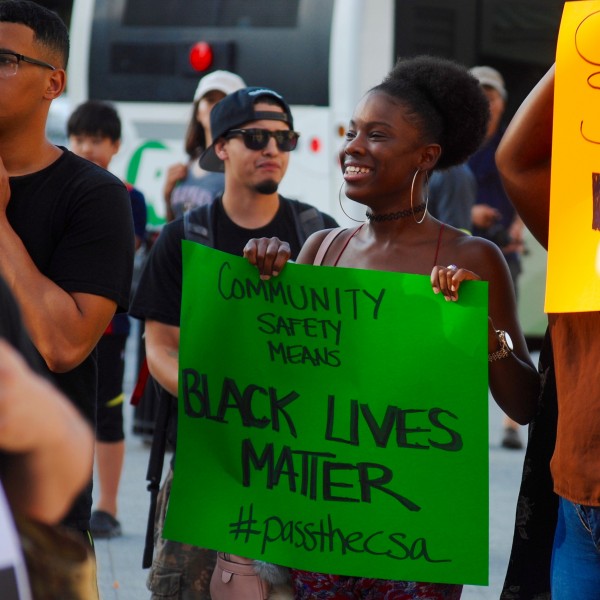


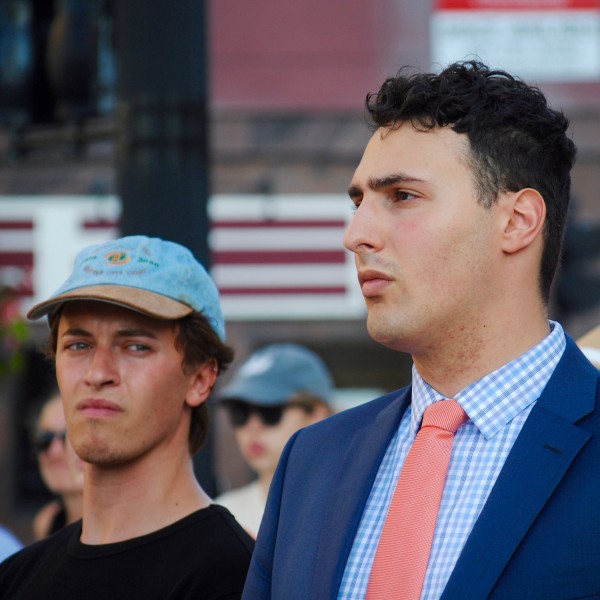
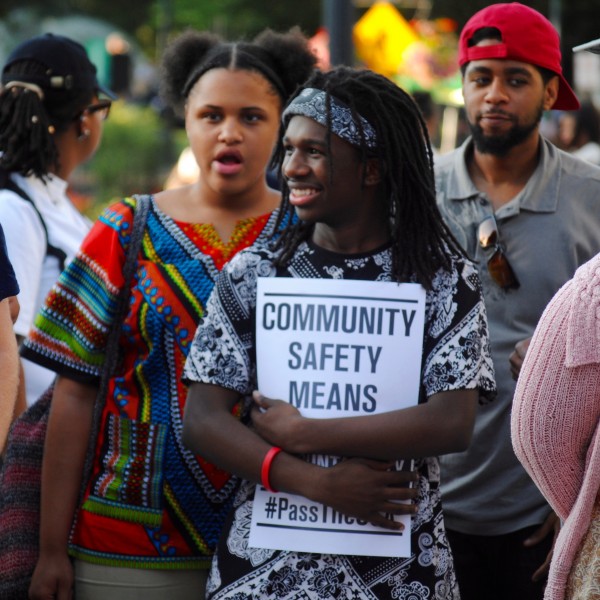
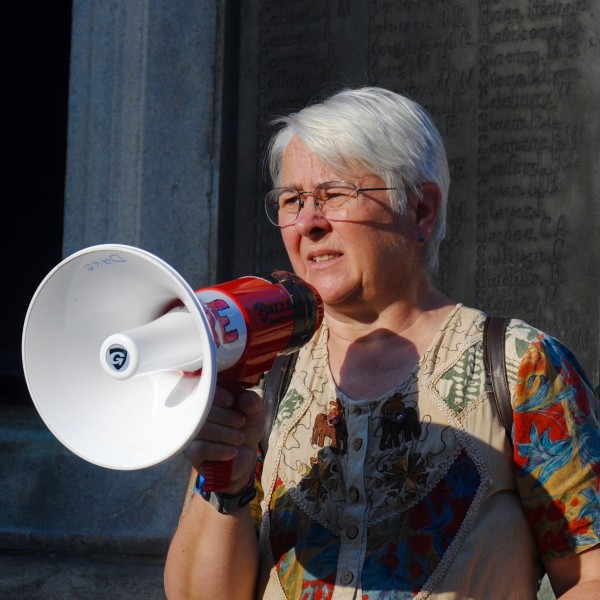
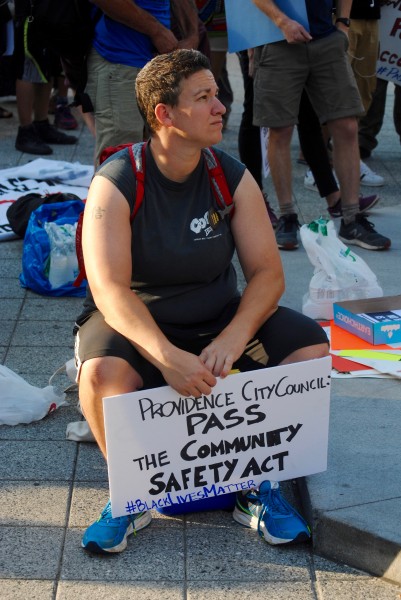
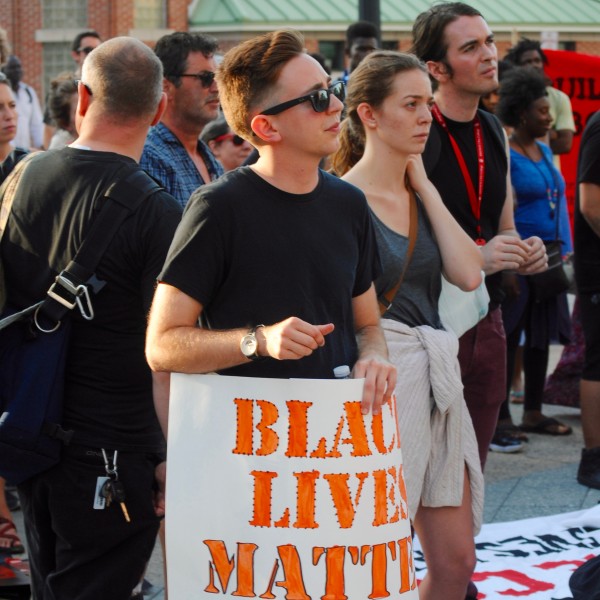
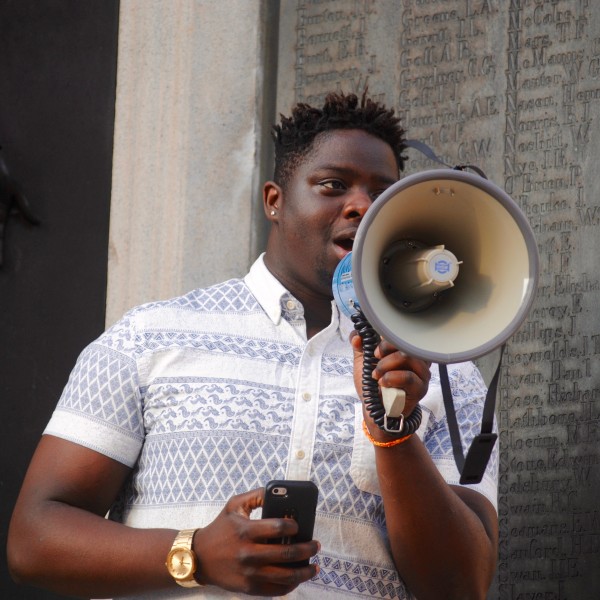
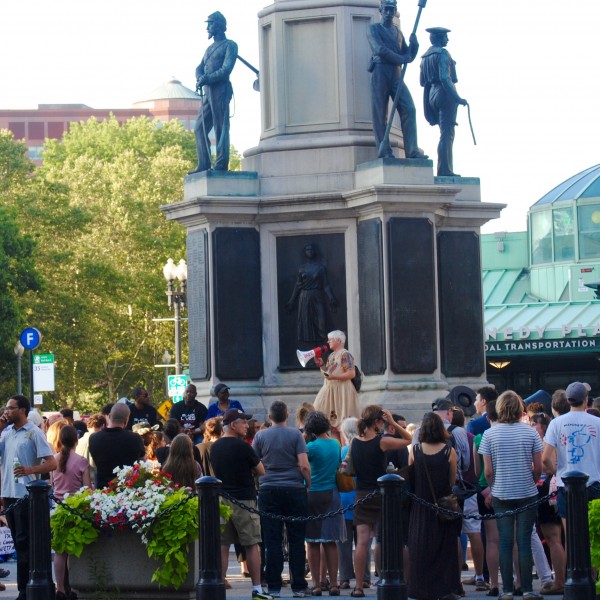
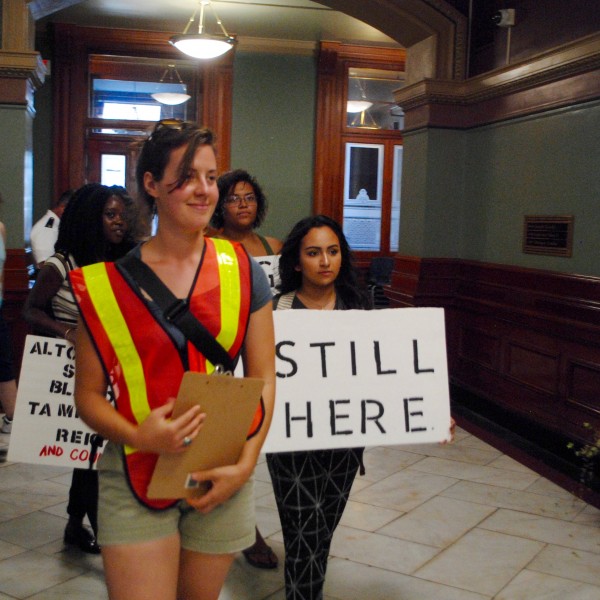
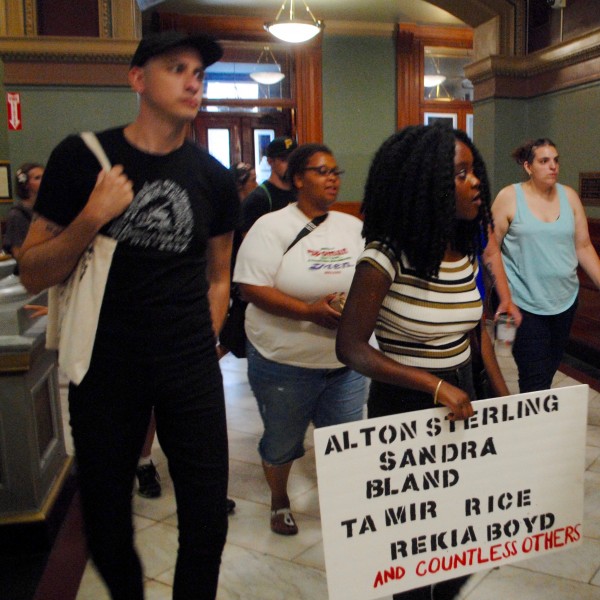
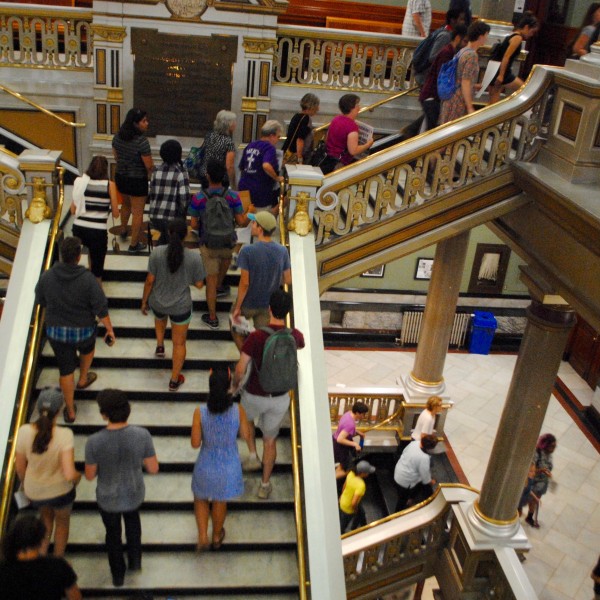
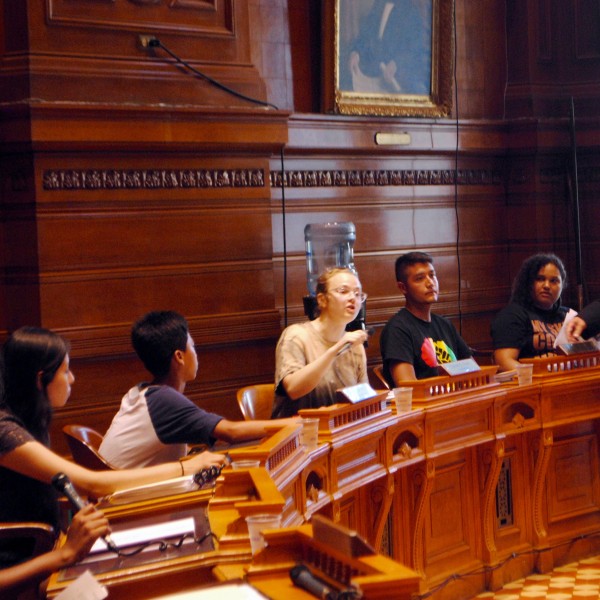
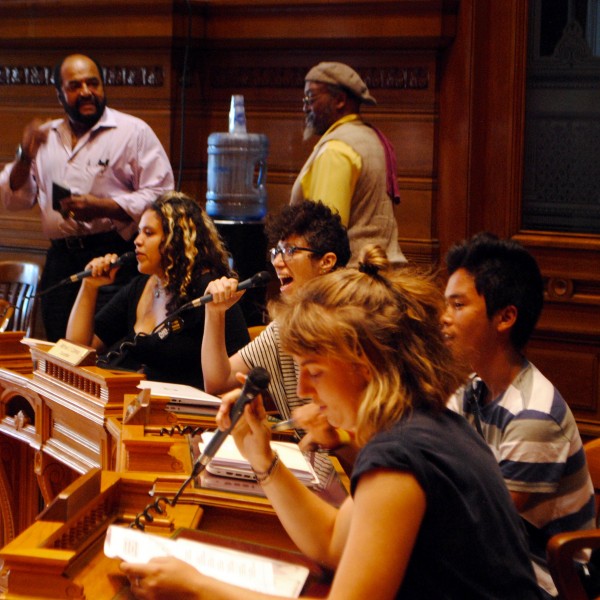

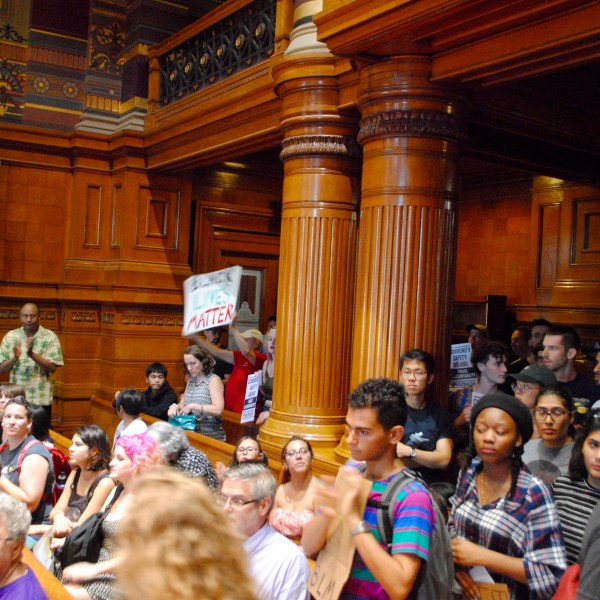
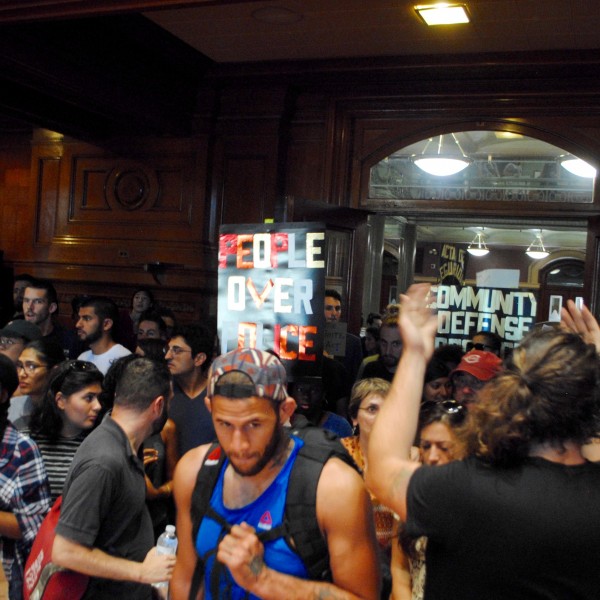
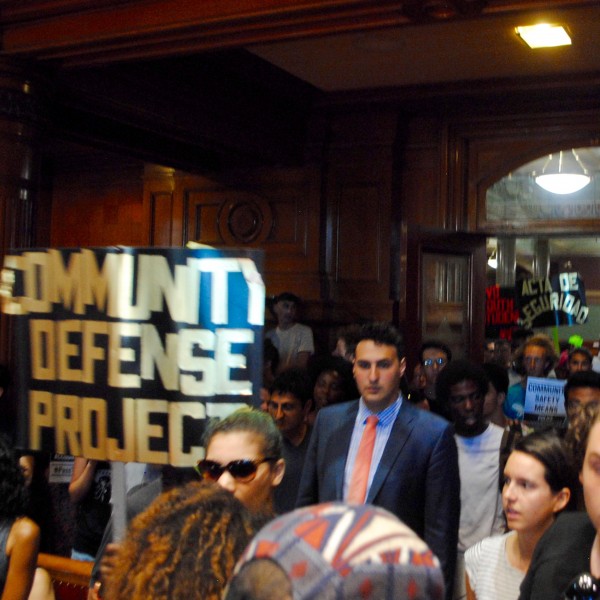
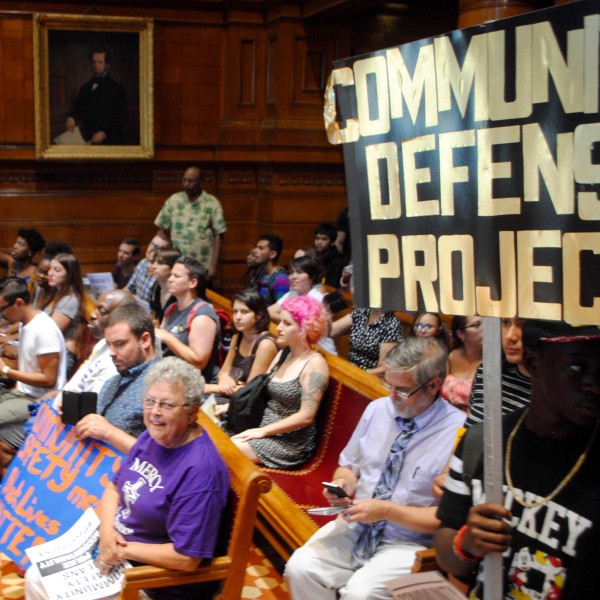
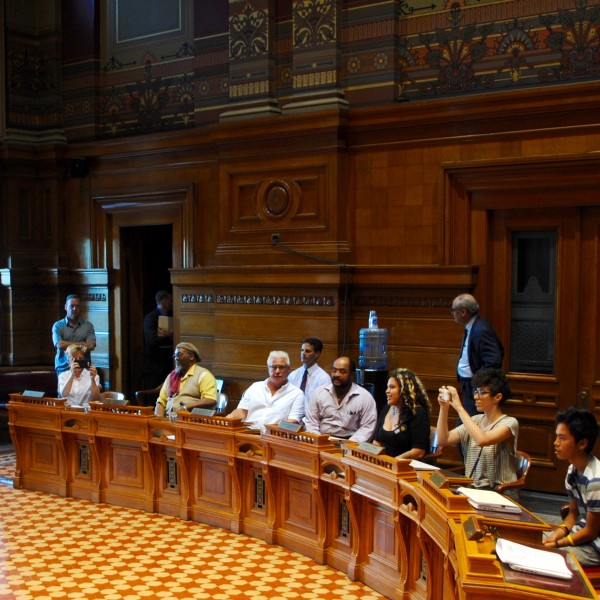
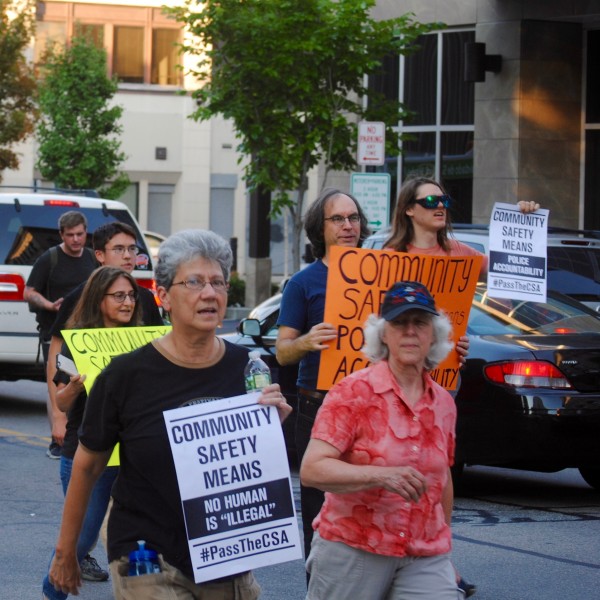
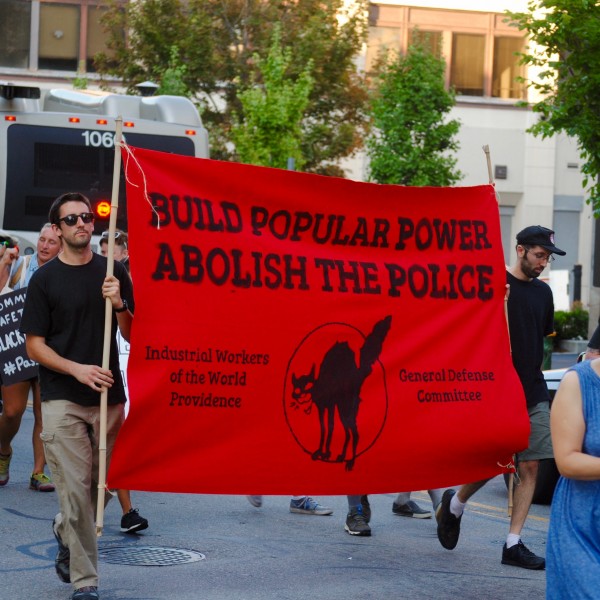
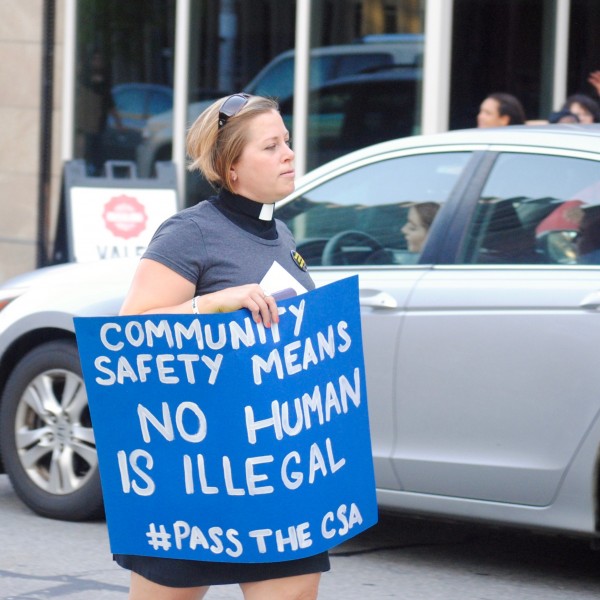
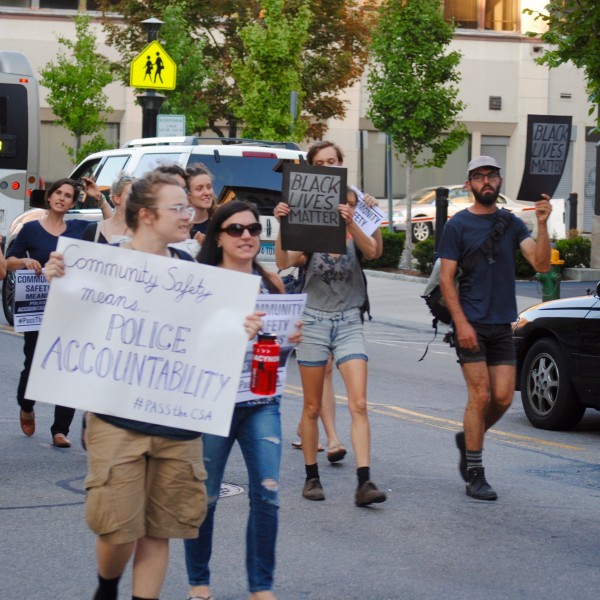
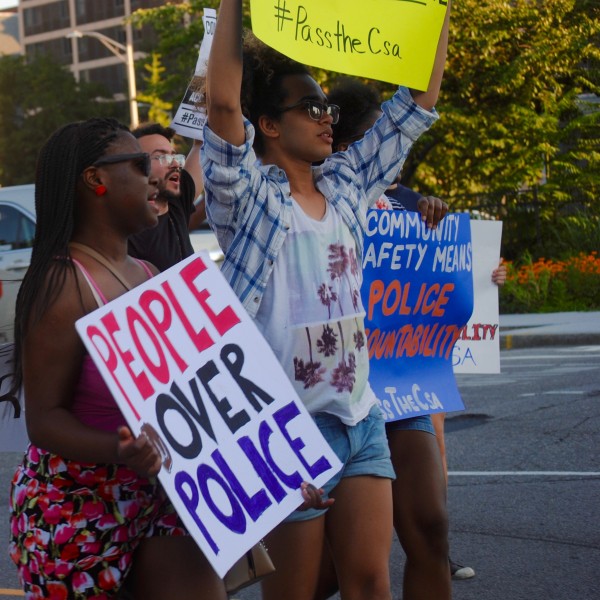
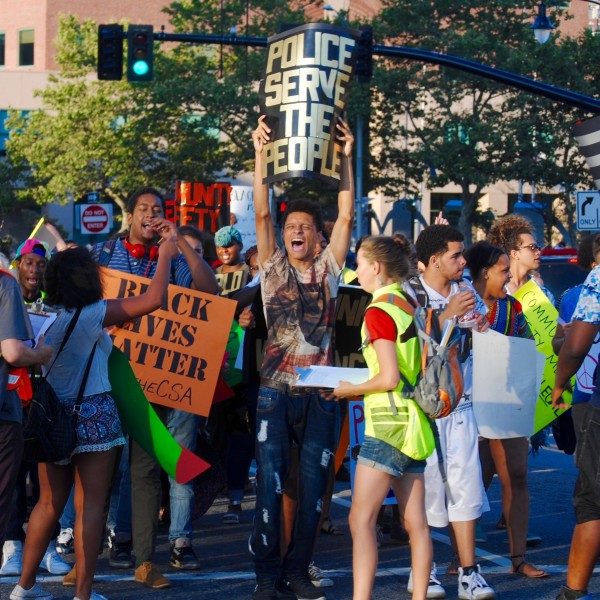
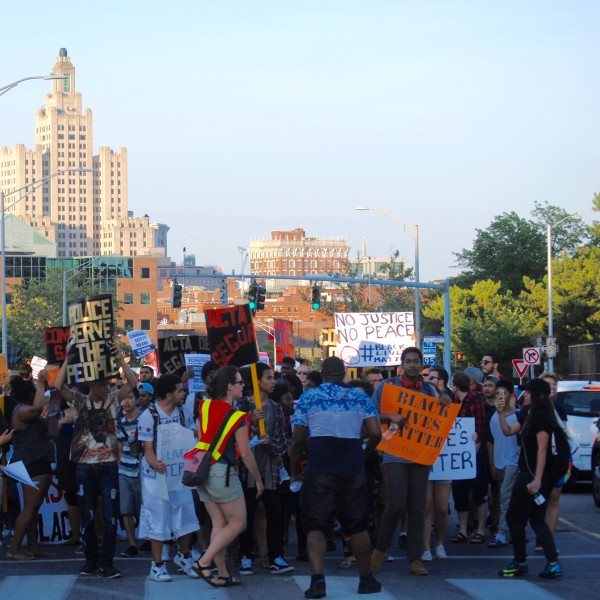
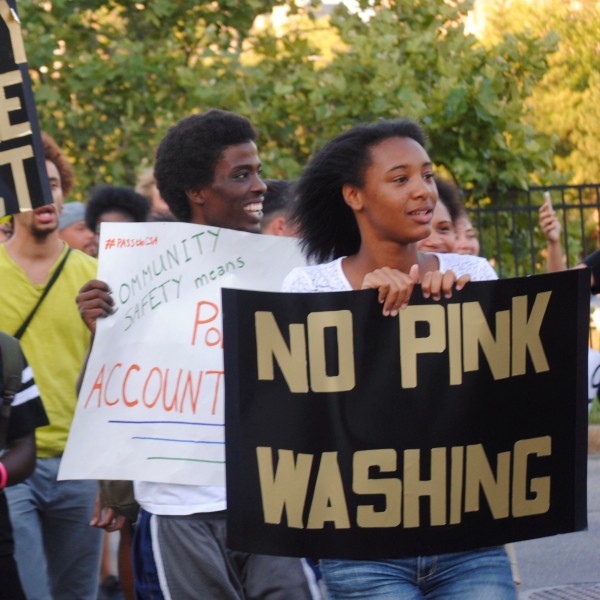
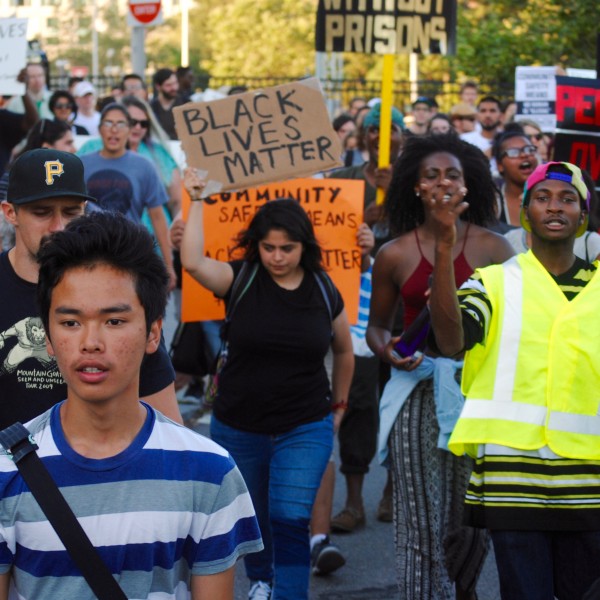
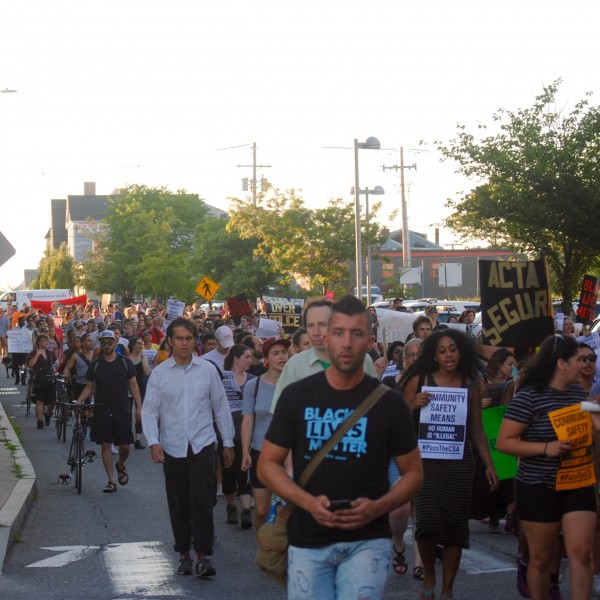
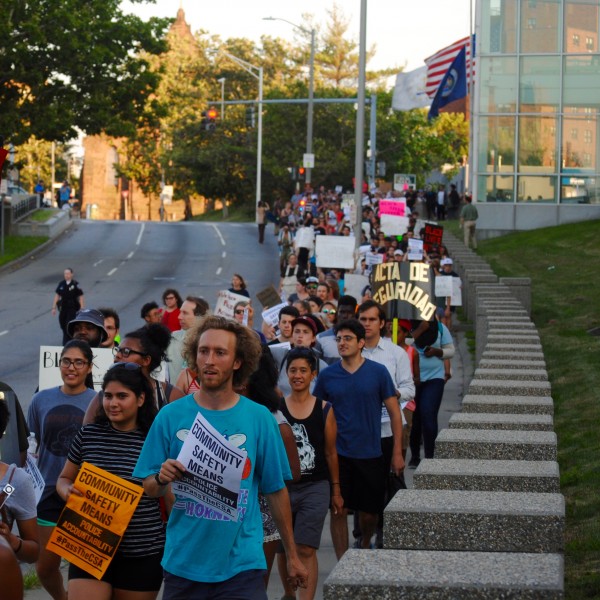
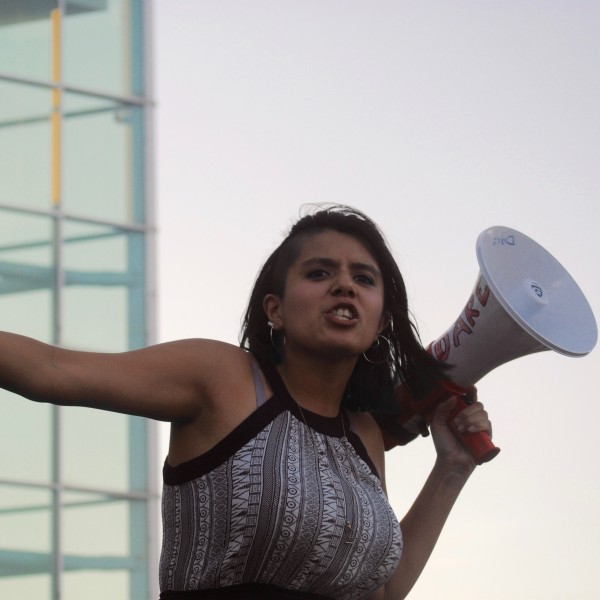
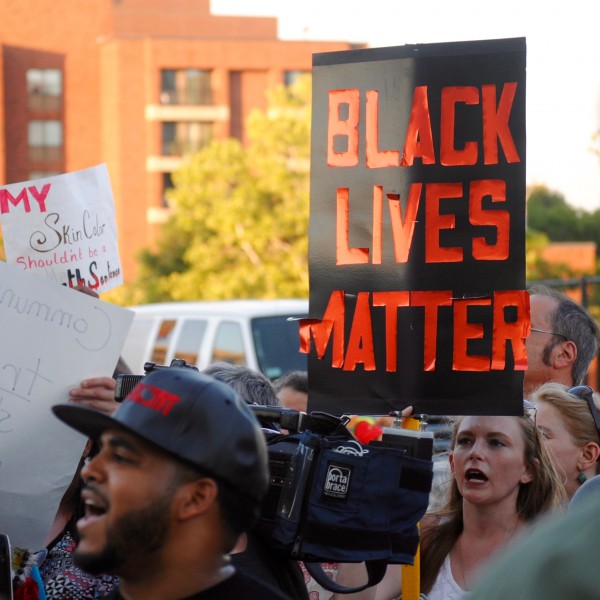
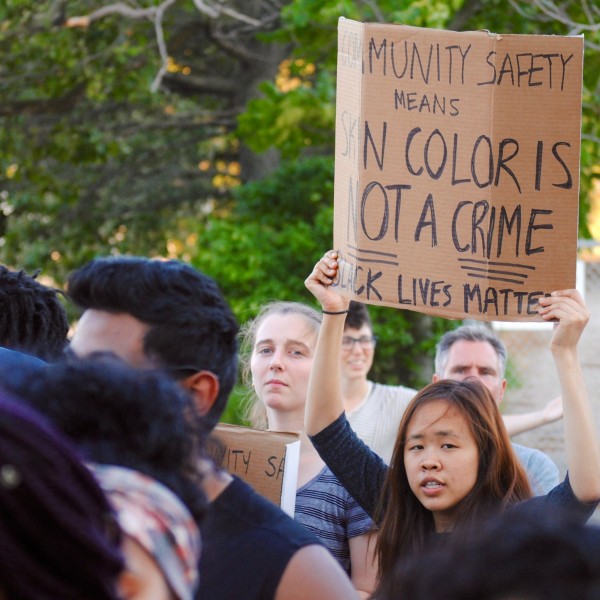
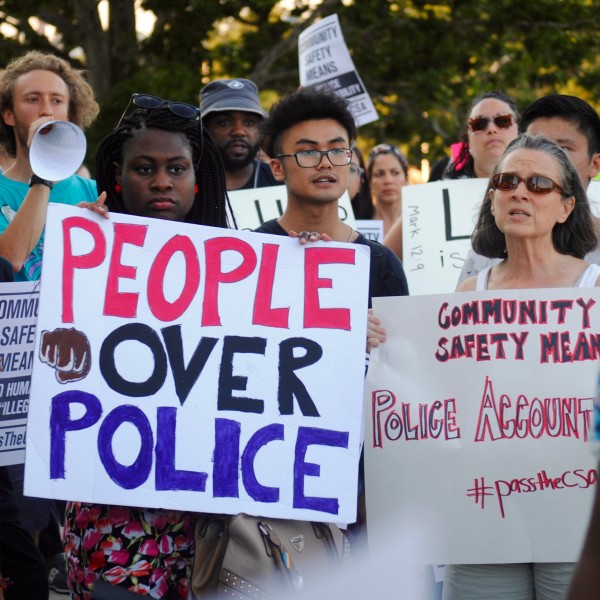

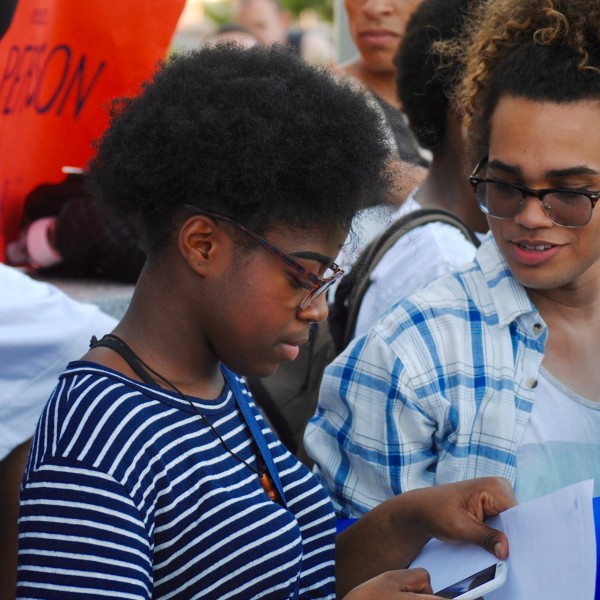
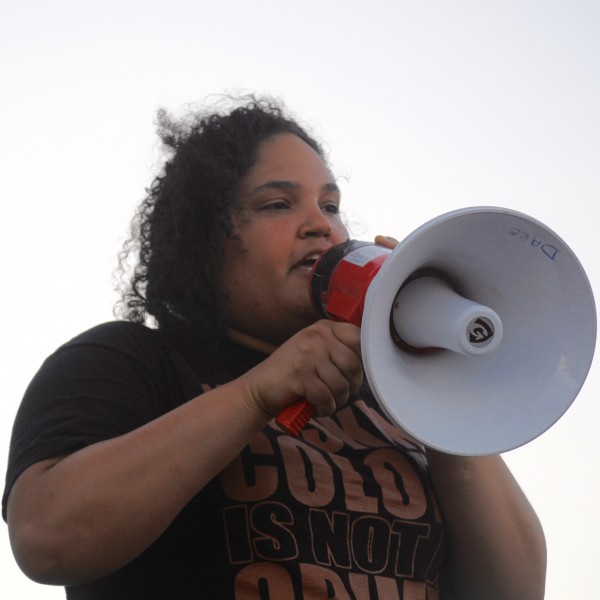
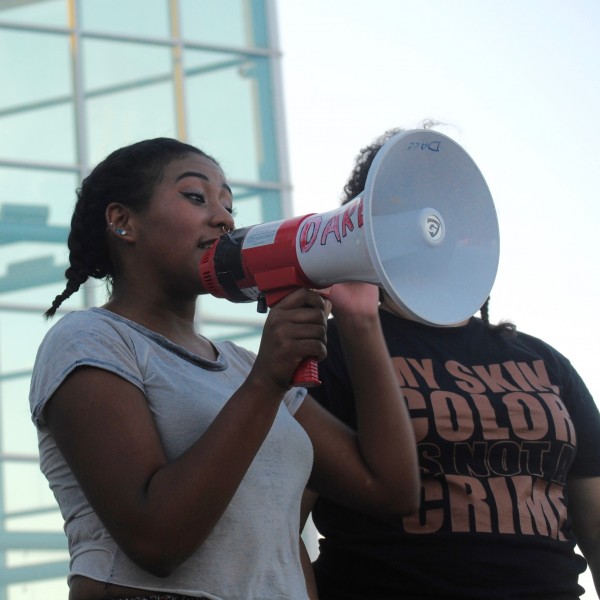
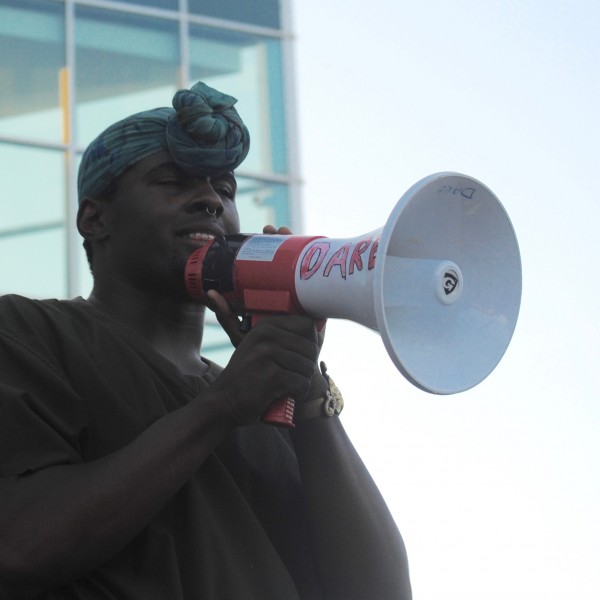
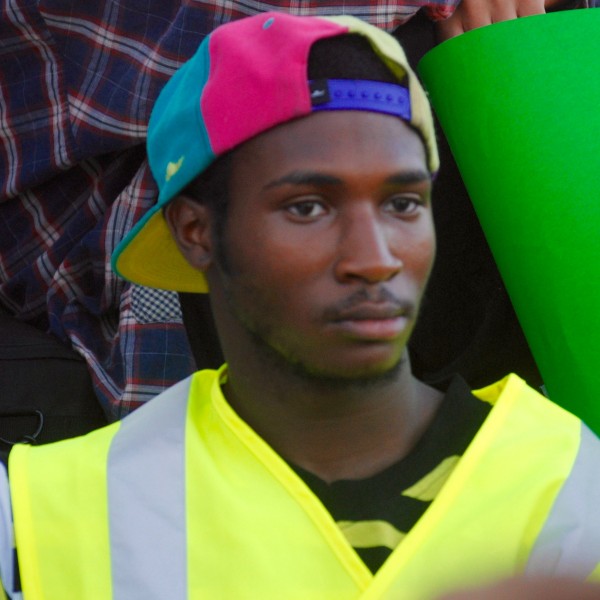
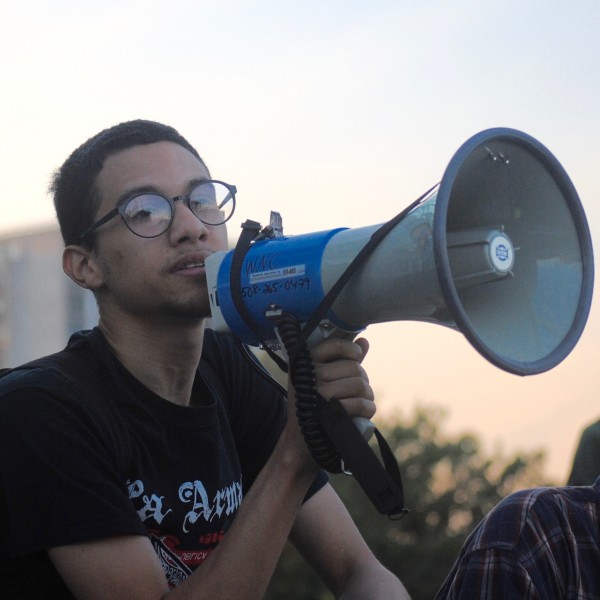
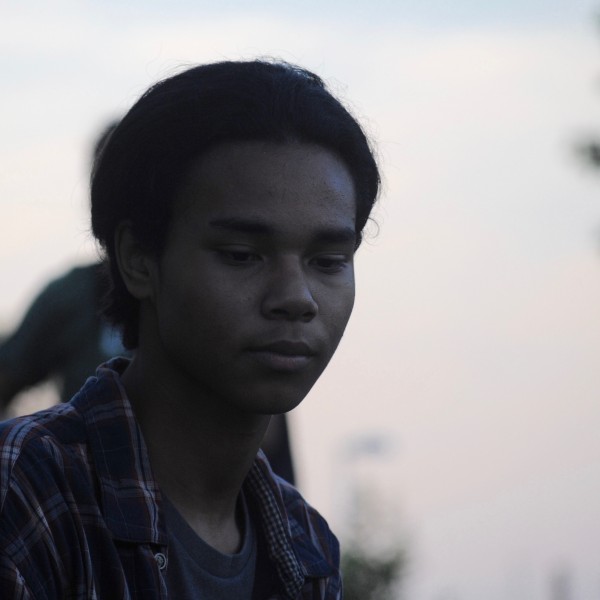
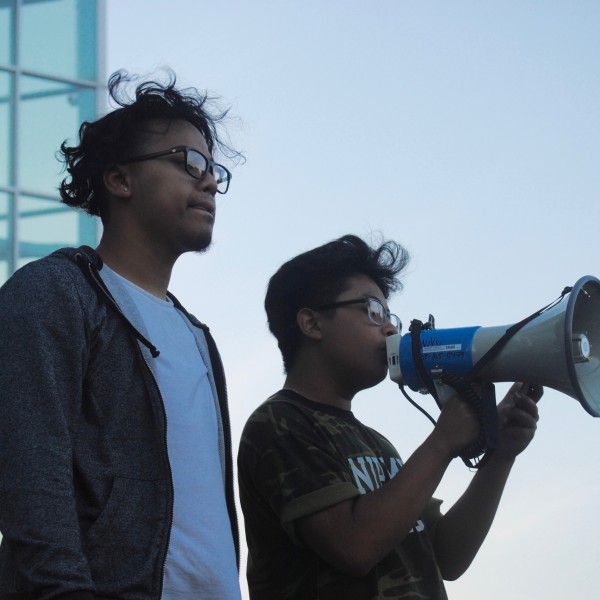
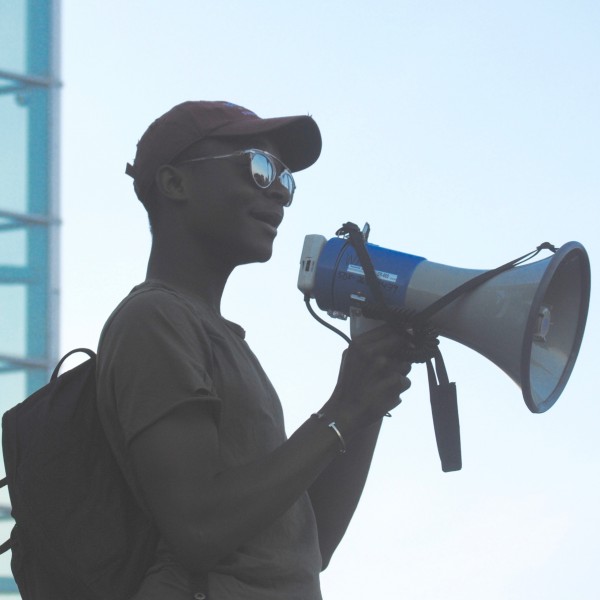
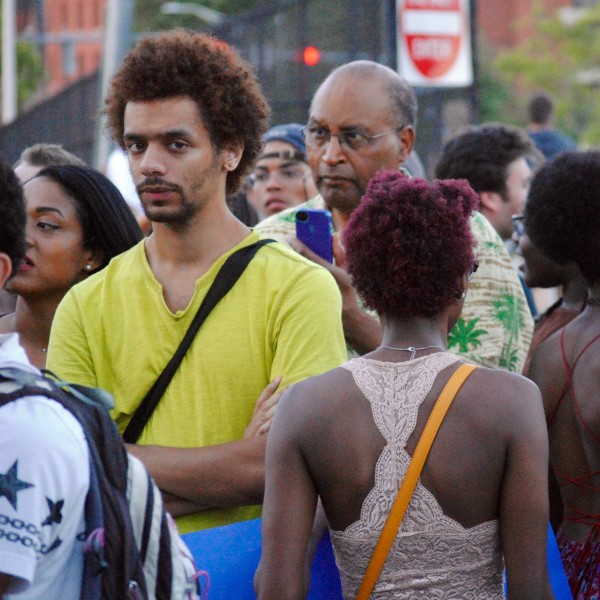
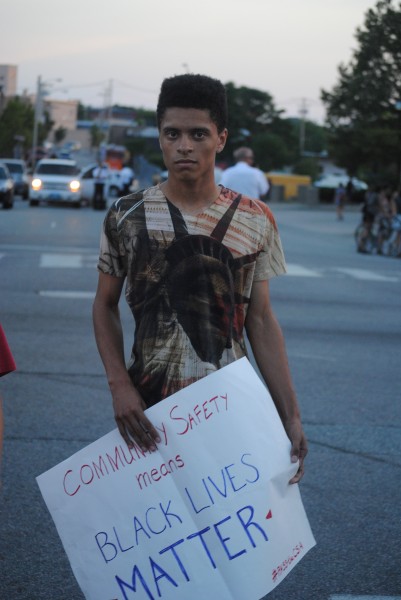
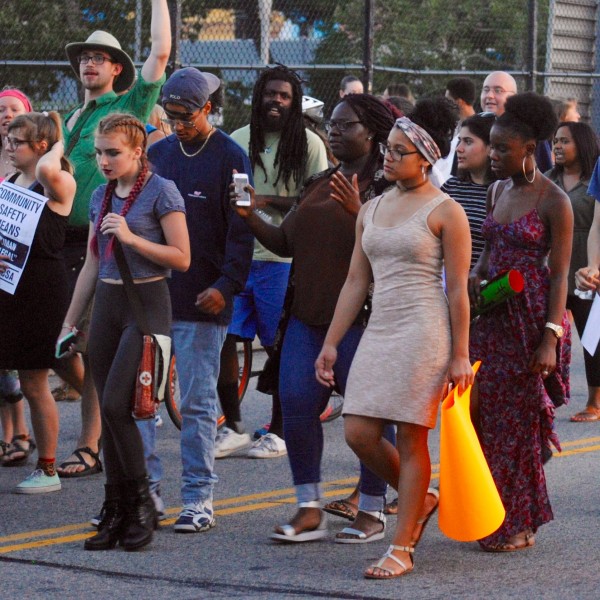
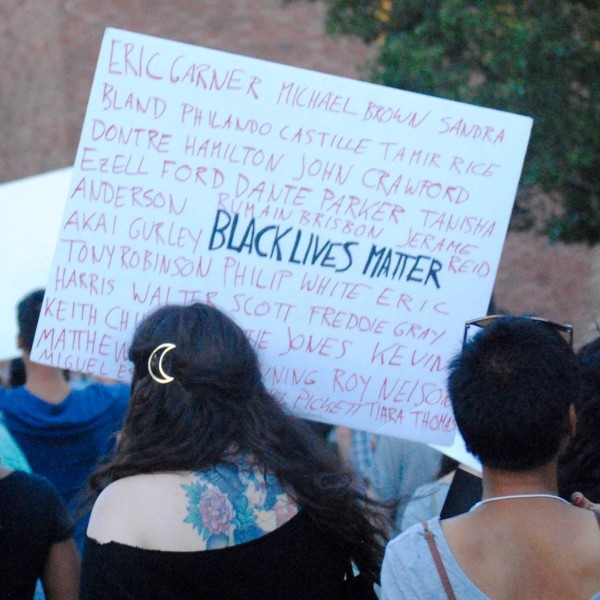
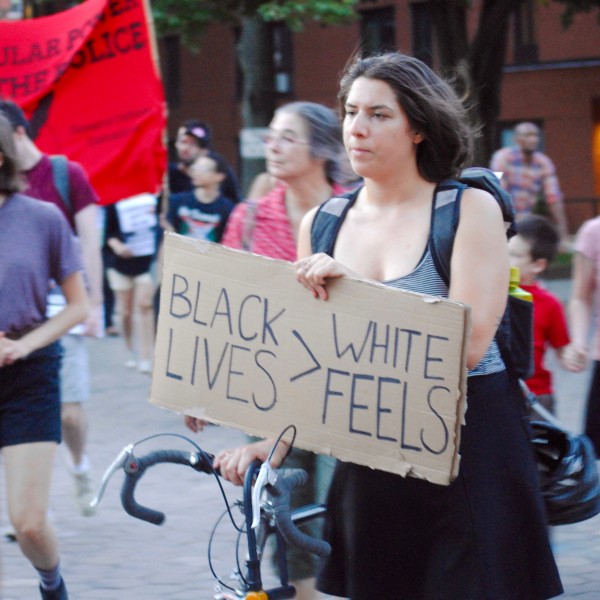
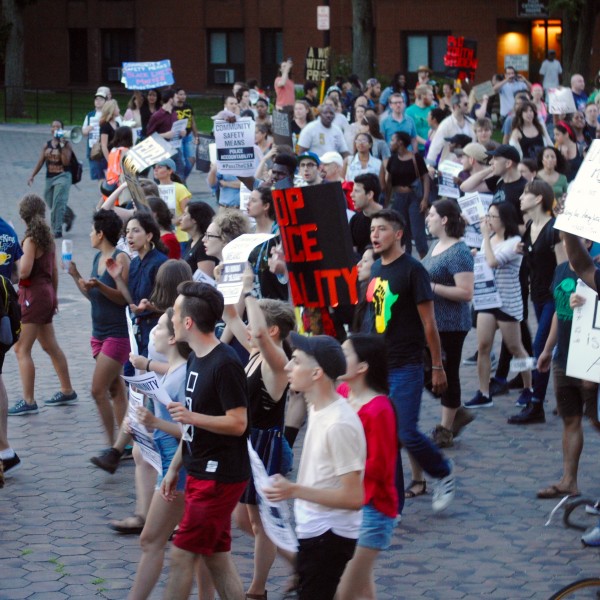
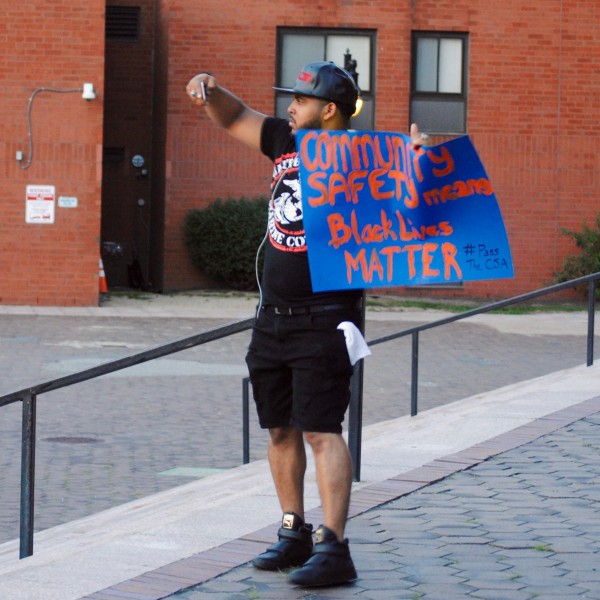

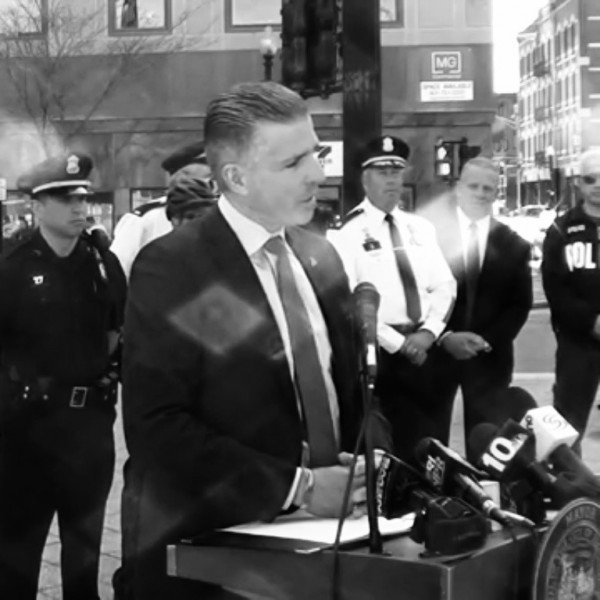
“Panhandling is common in Kennedy Plaza,” said a reporter at a Jorge Elorza press conference yesterday, “is that going to be addressed in addition to the drug dealing?”
Providence Commissioner of Public Safety Steven Paré was standing behind a podium, having just announced the results of a months long effort to arrest drug dealers in and around Kennedy Plaza downtown. The drug dealers were selling prescription drugs, like Oxycontin, as well as cocaine. Police were particularly concerned because Kennedy Plaza is a spot where hundreds of schoolchildren transfer buses every day.
The question, from a female reporter, was off subject, and suffused with ugly assumptions about the homeless, equating being poor and asking for help with selling drugs to children.
To his credit, Paré was unequivocal in defending the rights of panhandlers to ask for money. “Panhandling is legal, so, by standing in an open space and asking for a donation… is legal and we will not be doing anything because it’s been deemed a constitutional, legal right. Panhandling has nothing to do with [the drug dealing arrests]. This is illegal behavior, the selling of drugs. Any other illegal behavior will not be tolerated as well. We will focus on that kind of activity that is illegal and makes people feel unsafe.”
So one reporter went off on a tangent and Paré shut it down. End of story, right?
Nope.
“Some would argue that [panhandling] is also a safety issue,” countered a second reporter.
Paré reiterated that panhandling is a constitutional right, decided by the Supreme Court. It is not an illegal activity, it is a protected, First Amendment right. Blocking people and demanding money is not panhandling, said Paré. Such behavior is a crime, but standing or sitting and asking for money is not illegal.
That should settle it then, right? This is, after all, a press conference abut the arrests of 14 drug dealers…
Nope.
A third reporter now asks about a meeting Paré had with various groups in Providence about the court decision that upheld panhandling as a constitutionally protected right.
“What was the outcome of that meeting?” asks the third reporter.
Paré explained that the meeting was called to discuss the ruling and to deal with safety issues around Kennedy Plaza. “Panhandling is something completely different than what we’re talking about,”said Paré for a third time. Drug dealing, he said, “is criminal behavior.”
So what happened?
Three reporters at this press conference worked very hard to equate being poor with being a criminal. To his credit, Paré did not take their bait, but this line of inquiry from the press does raise serious questions about the media’s complicity in promulgating stereotypes about homelessness and the criminalization of poverty.
Barbara Kalil, a homeless advocate who works downtown, told me after the press conference that she was happy to have Paré on video so strongly advocating for the rights of the homeless. The arrests downtown were of drug dealers, and the homeless community was not involved, she said. In fact, until this press conference, she was unaware of these arrests.
Note: Because of the noise on the street and the fact that my camera was on Paré and not on the reporters, I had to amplify the sound artificially when the first two reporters spoke. The third reporter was right next to me.
